#or talking multiple antagonists into killing themselves
Explore tagged Tumblr posts
Text
When I first got into Fallout and was delightfully babbling to my friends about all the fucked up vault experiments and such they looked at me like I was crazy and asked why the hell I liked it so much. At the time I didn’t really have an answer other than I liked the contrast of how silly it could get compared to the darker qualities—how it bounced between the two or combined them into a wonderful satire on capitalism.
After watching and rewatching the show, logging hundreds of hours across multiple games, and several posters up on my wall later, I think I finally understand why.
The games are set up for you to be the hero, to make your slice of the wasteland a better place, but unlike a lot of other media, being the hero is an active choice that you have to make over and over again. You are presented with a cruel, violent world that brings out the worst in humanity, and yet these games ask you to be kind, to help out an NPC with a small favor, or sacrifice something important for the greater good. It isn’t easy. A lot of times the best choice isn’t going to be perfect either, with many ethical decisions boiling down to harm reduction or the lesser of two evils—whatever gives the wasteland the best chance at survival. Sometimes you need to bloody your hands, but other times the better outcome results in maybe not forgiveness but refusing to act on revenge. Heroism is often challenging and morally grey at times.
Sure, you could choose to be evil, but it’s almost too easy—I find it so much more satisfying to be empathetic, to surprise characters with hope that the world doesn’t have to be so bleak. I guess in many ways it’s a type of Superman fantasy, having not only the desire to be kind but the power to be so in a world filled with darkness.
And it’s not just the player character vs the world, there are plenty of companions and other NPCs surviving and working to make things better. Here you are at the end of the world, yet people endure and life goes on. People grow crops, tend to livestock, and set up trade. They build communities and carve out homes in the ruins of the old world.
I guess in simpler terms, I like Fallout because it’s a hopeful display of humanity persevering. War may never change, but men can. I think a light in the dark is always going to get me, especially when that light is a spark trying to illuminate an entire sea of darkness. That spark may be hard to find, but goddamn how impressive is it that it’s trying so hard against all odds.
#fallout#fallout 3#fallout new vegas#fallout 4#I do love capitalism satire too#and causing mass amounts of violence with silly and/or badass weapons#or talking multiple antagonists into killing themselves#we all love silly violence and I think that’s what people outside of the fallout fandom see#like it’s true but it’s so much more than that#also good tunes 👍
121 notes
·
View notes
Text
top five things i am currently insane about in borderlands as usual:
a) timothy lawrence and the way that he's so commonly misinterpreted. i want to see an in-depth exploration of all the less "funny cute anxious bean" or whatever aspects of his personality. i want to see the remnants of jack still lingering in his personality and the way this makes other people uncomfortable sometimes. i want to see the fact that he's a resilient mf who survived being a vault hunter. i want a genuine exploration of the relationship (platonic or romantic) that he could have with moxxi, where they both simultaneously explore the people that they are underneath the literal mask/corporate image of themselves that they present. i want to see the crimson raiders send him to atlas for a new hand because rhys fucking OWES them after they saved his ass, and i want to see him have a conversation with zer0, one of the people who killed jack. i also want to see him accidentally scare the shit out of rhys on multiple occasions. I WANT TO SEE IT ACKNOWLEDGED THAT HE'S TERRIBLE AT ACTING LIKE JACK ON PURPOSE, but when he's not intentionally doing it? jesus, it catches you off guard. sometimes the things he says as himself sound like something that would naturally come out of jack's mouth.
b) katagawa jr. can i ever decide entirely whether or not i wanted him to be reworked into a more competent, long-standing antagonist that would EVENTUALLY be killed by rhys personally in a grand display of him killing a foil of himself/ a representation of the worst person that he could have become in order to protect the new future he built for himself and all the people working for him- OR an eventually slowly redeemed character who survived the vault hunter's attack only to be disgraced by Maliwan and forced to gain a new perspective on the world much the same way Rhys was when he was initially ousted to being a janitor at Hyperion before going to Pandora? no. i cannot decide which of these paths i like better, but i really want either of them to have happened.
c) pure unadulterated rage about what they did to vaughn's character post tftbl. that's it. no elaboration needed.
d) the lack of content about maya meeting and knowing about other sirens and getting to connect with them over their experiences. i want to see more about her personal horror encountering angel in bl2- realizing that this can be a siren's fate sometimes if they're unlucky or defeated, weaponized and used for their powers as a tool. i want to see her meet lilith, and bond with her over the weight on their shoulders- being a vault hunter and a siren all at once and being looked up to as a legend, a myth, and a saviour all at once. also why the fuck did they kill her off in bl3 it's so fucking awful she could've been an awesome returning character and instead of just having her return to athenas they could have done a whole arc about her begrudgingly returning to her place of origin despite complicated feelings about it because they're in danger.
e) TANNNNNNNNNNNISSSSS. i love patricia tannis. number one tannis fan over here. i just want to see more of her interacting with everyone in general, actually. sirens and eridian history are her favourite, let me see her talking lilith and maya into silly experiments for her own personal gain. making friends, slowly, as she connects with the crimson raiders more closely than she thought she would, with other scientific minds. like hammerlock! they have different realms of study, but i like to think they'd get along. have her wander begrudgingly into moxxi's bar (unpleasantly loud and busy, but needs must) and ask her for a favour because she needs someone persuasive to convince the vault hunters to spare a bit of eridium for a machine she's got in the works. more her please
#borderlands#rambling#borderlands 3#timothy lawrence#maya the siren#borderlands 2#patricia tannis#katagawa jr#vaughn the money man#rhys tftbl#bunch of other mfs i wont list them all#tales from the borderlands#etc.
144 notes
·
View notes
Text
The Owl House and Fullmetal Alchemist
So let’s talk about how The Owl House’s parallels to Fullmetal Alchemist, how it may or may not take inspiration in certain aspects, etc. Dana Terrace mentioned once that Luz would love Arakawa’s art, and even without the confirmation that Dana herself is familiar, it’s pretty clear…
(And yes, I’m discussing the 2003 continuity because why not; Depending on when she got into FMA, it might’ve been Dana’s first exposure to the series even!)
We have a magic system that can be accomplished two ways; Either by drawing circles with patterns, or by using your hands. In FMA, the former is the norm, the latter the exception; In TOH, it’s the other way around, with our main character Luz having to rely on glyphs.
Luz and the Elrics lost a parent, but they have one who’s still alive that they have mixed feelings with, but ultimately reconnect with near the end of the series. The loss of that first parent motivates them, it’s what leads to the inciting incident, with the Elrics trying to bring their mother Trisha back to life only to lose an arm, a leg, and a body; Luz carries on her father’s final gift, and in her attempts to be true to herself as Manny taught her, she ends up being sent to Reality Check camp, with her mother Camila agreeing due to not being as brave.
The permanence of death is something for characters to struggle with; Multiple characters in both versions of Fullmetal Alchemist attempt to revive the dead for this reason, or prolong their own lives by ending the lives of others. The closest attempt to reviving the dead is in 2003, in the ambiguity of its Homunculi, who may or may not be the souls their creators attempted to bring back; And at the end of the series, the main protagonist is killed. But his brother Alphonse recognizes that his soul hasn’t yet passed an established threshold existing on a separate plane of existence, and is able to sacrifice mythical power he’s gained to bring Edward back to life, at the cost of himself passing the threshold.


Similarly, Luz also dies at the end of the series to protect the Collector; But because her soul hasn’t yet passed the established threshold that exists on another plane of existence, the Titan is able to use his power to bring her back to life, even as he himself passes the threshold. Luz dies as a lesson to the Collector in the limitations of their own power; Edward’s tragic encounter with Nina reminds him that for all his boasting of alchemists as the closest thing to God, alchemists are still mere mortals with limitations, which is a major factor into his main antagonist’s motives.
The Collector’s childish naivete extends to their lack of familiarity with death, and they eventually have to come to terms with it and other consequences as part of their character arc. The Collector is the youngest sibling of the Archivists, who themselves have a petty relationship with death; They seek to preserve all living things eternally via scrolls, but this state destroys their physical bodies, preserving only their souls. Any population that doesn’t go along with their plans of preservation are wiped out by the Archivists in retaliation.
The Collector’s story can also be compared to Wrath the Homunculus from 2003; Both are immortal child antagonists who stand out thanks to their magic. Both are manipulated by Belos and 2003 Envy (guys who murder their blonde brothers via stabbing), and are isolated to do so. They feel anger over being mistreated by parents and older sibling (figures), but ultimately just want companionship.
They have bittersweet endings; The Collector goes off into space, but still occasionally visits his mortal friends; Wrath goes off on his own, but occasionally interacts with Winry, and finally sacrifices his life to help Alphonse reunite with his own beloved family member, as Wrath gets the same in death.
But for all of the mixed feelings about death, immortality may not be so pleasant either; King Clawthorne is doomed to outlive everyone except for the Collector and Hooty, which means so many loved ones dying before his eyes. This is a fate Hohenheim dreads regarding his wife and children, and he manages to avoid this when he sacrifices the power behind his immortality to save the world, and die a mortal whose age finally catches up to him. This might be why the immortal Archivists preserve mortals as scrolls, though their reaction to those who refuse them is suspect…


EDalyn Clawthorne, EDward Elric; They’re main protagonists, with a color scheme consisting primarily of dark red, with gold, black, and white. They’re teen prodigies, although both lose their magical abilities in order to protect a loved one who stars right alongside them as a fellow main character. This is never restored, and they also lose their right arms due to being part of a deadly spell. They’re quite (in)famous and have a sibling. Of course, Edward works for the state; Eda is devoutly against it, a proud criminal.
There’s a running theme of disability, with Eda’s disability coming from the curse, which eventually drains her magic. It leaves her fatigued, is implied to be messing with her memories, and causes her to age more quickly. It even makes her transform into an Owl Beast, due to the curse coming from Eda being possessed by one. When the curse completely overtakes Eda, Lilith takes on half of it to allow Eda to regain her usual form, but her and Lilith lose their magic forever. In the context of a society comprised of witches, Luz is essentially disabled, as is Hunter; For Luz, glyphs are her magical prosthetic, as is Flapjack the Palisman familiar for Hunter.
Edward lost his arm and leg, Alphonse lost his body. Izumi lost some of her organs and regularly suffers from fainting and exhaustion, as well as vomiting blood. Lan Fan loses her arm. Automail is aesthetically cool, but it’s also a hassle and requires a months-long process to get used to, and even then you need a mechanic to maintain it. Ed has to return to said mechanic, his childhood friend Winry, multiple times, and suffers from his prosthetic overheating or nearly giving him frostbite, depending on the temperature.
Disability sucks; And it’s something you just have to learn to live with, in Eda’s case. She accepts her curse, she’s not interested in her mother Gwen’s attempts to cure it, which just make her feel ashamed of the curse and lead to a breakup with her lover Raine. In 2003, we see a man who lost his leg but doesn’t use Automail to replace it, explaining to the Elrics his decision, and being validated and respected for it by the narrative.
Ed and Eda’s disabilities are connected to a magical incident involving another being they constantly live with; This being lost their body, and their soul had to be bound to something else… For Ed, this is his brother Alphonse being bound to a suit of armor. For Eda, this is the Owl Beast having to be bound to her body, which is what the curse is; Technically a parasite draining her.
Despite this, Eda figures out a way to work with the Owl Beast, recognizing it’s also trapped with her. And you can see similarities between this dynamic and Ling Yao with Greed, a Homunculus who embodies his Father’s desires. Greed and the Owl Beast both manifest as red magic, linked to the main villain in some way; Father is the source of his childrens’ soul-fueled Philosopher’s Stones. Thanks to the Collector, Belos wields the same red magic as the Archivists who reduced the Owl Beast into a contained soul that can be melded with another living being and their body.
Ling accepts Greed’s red Philosopher’s Stone into his body, and the two form a friendship where they take turns. Ling’s body becomes superhuman like a Homunculus, complete with regenerative abilities, and the power to rearrange the carbon in his skin into an indestructible Ultimate Shield.
Likewise, Eda comes to a mutual agreement with the Owl Beast after befriending it, having to make concessions such as letting the creature take over her body to feed; In exchange, Eda is able to achieve a harpy form she has proper control over, granting her flight and enhanced strength and speed, as well as claws. It’s nowhere near what she could accomplish with the magic she’s still missing, and she still needs to take elixirs… But it helps.
Ed and Eda’s lineage can be traced to a blonde man who has a (blood) brother, the main antagonist of the series. While the antagonist chose evil, the brother chose to renounce this, leaving him behind to have a child with someone he fell in love with.
The antagonist is located at the center of the setting, within a giant fortress. Their lairs are filled with gears and haphazard pipes. Despite their appearances as elderly, long-haired humans, they have a true form; A viscous monster covered in eyes. During the final battle, they project giant versions of themselves atop their own fortress.
The villains also share a similar white, holy aesthetic, drawing upon the image of Christian patriarchal figures; One of them is canonically Christian, in fact. Both are motivated in different ways by some relationship to the idea of God, with Father wanting to become him, and Belos insisting he’s doing God’s holy work. They consider themselves as being born special, as having some aspect of God carried through them.
Despite their delusions, their narratives make it clear that they didn’t actually work or earn any of what they’ve accomplished; They’re nothing more than thieves piggybacking off of the efforts of others, glorified parasites who didn’t learn or mature at all. The Truth dismisses Father’s questions of what he should’ve done differently, responding that he clearly knew all along, he just ignored it; Similarly, Belos is shown to be aware deep down that he’s a treacherous hypocrite. And yet they both ignore these things, failing to self-reflect.
Their plans are similar, waiting for the eclipse so they can enact a Promised Day/Day of Unity. They’ve been working for centuries to do this, establishing a corrupt nation to do so, with all of its citizens and military unaware that they’re setting up their collective demise. There’s a spell circle cast, and it requires a group of skilled alchemists/witches to activate it; For FMA these are five alchemists who have seen the Truth. For TOH, these are the nine Coven Heads, witches powerful in one of the nine tracks.
(Belos definitely did a better job at this, having backup witches and replacing coven heads for fifty years; Father didn’t have any until a few years prior to the Promised Day, and just barely figured out the remaining three within that last year. The last one was prepared literal minutes before the eclipse.)
They both absorb the power of a God/Titan that is sort of God but not really, more on that later, to become all-powerful; But they are separated from that power. Their final moments are similar, insisting to someone else that they did nothing wrong, only to be met by unimpressed silence, angering them. They die reduced to a humiliated, pathetic little thing, because that’s what they are at their core. This all-powerful villain with the power of a god is brought down not by equivalent magic of any kind, but with a simple bare-fisted punch, or a stomp from a foot.
The villains run on the lives of countless innocent beings that they’ve consumed across the centuries, and without this energy, they die. The villains’ magic is arcane and red, defying the usual logic. At the center of their lair, they mess with the source of the setting’s magic, rendering it ineffective. Their evil began about 400 years prior to the start of the series, when they began consuming these innocent lives, and despite their good relationship with their brothers, pushed him away; This brother would set in motion the villain’s defeat via his child(ren).
The souls of the consumed are still alive, and attempt to fight back; In particular, Belos has a resemblance to Envy, an extension of Father’s personality. Their human appearances hide monstrous green forms; Belos’ is a result of the Palismen souls he devoured, whose faces emerge and writhe from the amalgam they’ve become, like how Envy’s true form has the souls of his Philosopher’s Stone emerging from the flesh. They both have the ability to parasitically control others, and this is displayed/discovered after they’ve been enormously injured, reduced to a tiny little thing. They eventually use the lives of others to reform their bodies, only to get knocked down once again, and die.
There’s a human they tormented and have captured before, attempted to make an accessory to their plans and were successful to a degree, and found glee in their guilt, smugly talking hot shit about how it doesn’t matter. But those humans get the last laugh; Envy and Belos share very similar scenes where after their source of power is disrupted by said human, Envy and Belos are reduced to just an upper half, dragging themselves along the ground as they rave angrily at the silent protagonists, insulted to be looked down upon and insisting they’re still better, as they reach out uselessly to the human that has soundly humiliated and defeated them.


Belos and Father/Envy both have a disdain for a species, thinking themselves superior, only to be done in by them and their collective bonds and relationships; The villain has nothing to him. The one thing he has are his Homunculi; Artificially-created beings who resemble humans and have pink eyes. But Belos’ Grimwalkers inevitably defy him, just as Greed defies Father. These rebellious children end up as friends to the protagonists. In the 2003 continuity, a Homunculus is specifically what happens when you try to bring a dead person back to life, only to get a flawed clone with some of the memories.
This is exactly what Grimwalkers are, with Hunter and his predecessors being attempted clones of Caleb; Belos is another example of a character who refuses to accept death, at least for the one person he ‘cares’ about. He also refuses to accept death for himself, feeding on Palismen to prolong his existence.
Going further into 2003, we should also compare Belos to its villain, Dante; While Father is an inhuman being, Dante started off human, just like Belos, and both represent the worst that humanity has to offer, the banality of evil. Dante manipulates others into creating the Philosopher’s Stone before stealing it from them, using it just to keep herself alive; But her soul is eventually reaching its limit, and the Philosopher’s Stone is not enough. This causes bodies she stole from others to decay at an increasingly rapid rate.
Similarly, Belos used Palismen souls to become immortal, but eventually his form turns into a slimy green monster, and while he uses more Palismen souls to revert himself back into a human, one can see how the curse has begun to creep into his human appearance. By the end of the series, he is permanently the curse monster, and can only imitate the façade of his human appearance, and for a brief while. He also ends up possessing the bodies of others to survive, and one of them, the last Grimwalker, decays rapidly from the attempt and falls apart.
Dante is the master of the Homunculi and created four of them, while helping the other three regain a more human appearance. She’s a master manipulator and gaslighter, just as Belos manipulates Hunter, but also all of the people around him. They’re raging hypocrites and cowards, their motives very human; Dante wants to live forever, while Belos craves the righteous power fantasy of being a witch hunter. They represent dead people who refuse to move on, with Belos especially representing conservative, white supremacist ideology furious over the changes of the modern era, and rejecting them to continue his crusades regardless.
This also gets us into a villain introduced after Dante in the 2003 continuity; Dietlinde Eckhart, a literal Nazi trying to help Hitler rise to power. Eckhart is knowledgeable about the magic of another world parallel to ours, the world that is the series’ main setting; Belos/Eckhart manipulate a young girl of color into accomplishing their plans of genocide. Eckhart is fearful of the other world beyond hers and its magic, seeing it as an inherent threat that must be destroyed; In her efforts, she becomes consumed by supernatural forces, mutating into a slimy, unrecognizable monster and is killed in this state. They both have long-ish hair of a similar color, and the slime that consumes them starts to cover their face in similar patterns…
For the main FMA continuity, there’s a juxtaposition in that a society of humans is revealed to be run by a non-human who hates humanity and thinks he’s better for not being like them; In TOH, a society of non-humans is revealed to be run by a human who hates non-humans and thinks he’s better for not being like them. Belos sees the witches and demons of another world as an inherent threat that must be destroyed. He’s also much more thematically intertwined with the state he leads; Father is ultimately his own apathetic entity, letting others run it for him.
Amestris is an imperialistic state, it’s fascism, it commits genocide against an ethnic minority of brown people; It’s racist. Belos comes from a real life historical context, a very racist one, just like Eckhart; He’s a Puritan from a 1600’s American colony, relying on the delusions of Evangelicalism as his motive, Satanic Panic dialed up to eleven. His attempted genocide and damage to the culture and environment of a world he’s colonized is just the obvious extension of what Puritans like him did in real life; Eckhart is a literal Nazi helping Hitler rise to power, and Hitler cited the American settlers’ genocide of Native Americans as inspiration.
FMA 2003 places more emphasis on the corruption and racism of the state, and it can be seen as a criticism of the U.S.’s War on Iraq during its release. The War on Iraq was supported by Evangelicals, many of whom support Zionism in the same region due to their Evangelical desires for the Rapture to occur, and they see the establishment of Israel as part of the ‘conditions’ for this Rapture to happen.
The Promised Day/Day of Unity are both Rapture events; In the case of FMA, there’s a group of high-ranking military humans who believe they’ll ascend above the rest when it occurs. For TOH, this is what’s believed by the witches and demons colonized by the coven regime. With Belos especially, his Day of Unity is unambiguously a play on the Rapture due to his real life, historical background and motives.
Amestris may be led by a Fuhrer, but it’s meant to be a conglomeration of multiple Western powers, and its name hearkens to America. When you combine this with 2003’s commentary and Belos’ blatant Christian colonialism -imposing his own understanding of how God works onto the local Titan- and representing how other Puritans like him are factors into everything wrong with the U.S…. You can see how both series criticize real-life white people.
This also gets me into another character, Raine Whispers; They bear a resemblance to Roy Mustang in some ways, as they’re both high-ranking government officials aware of how their state persecutes others. They’re both selected by the villain as a key factor into their genocidal rapture spell. They both seek to use their positions of power to challenge the government’s atrocities. They both joined it wide-eyed and idealistic, only to realize the truth.
Both of them realize that in addition to the inherent corruption, there’s also a conspiracy afoot within the government; Their attempts to interfere lead to them being captured. Mustang attempts to find someone like-minded in the friendly Raven, only to find out he’s a part of it and has led him like a lamb to the slaughter; Raine expects an enemy out of Darius and Eberwolf, who prevent themselves as loyalists, only to reveal they’re on the same side after all.
Nevertheless, being captured leads to both characters being allowed to continue their duties under government surveillance, due to their role in the genocidal spell. But they find clever, under the radar ways to coordinate with their fellow rebels without being seen. There’s a scene in which Raine burns a message from Darius in the leadup to the Day of Unity, just as Mustang does in the leadup to the Promised Day.


There’s hope; All of our disparate protagonists coming together, different subplots like Luz and her family, Hunter and the students of Hexside, and the CATTs. Everyone comes together to find a way to stop the genocidal spell, and/or ensure others survive it; Armstrong sends his parents outside of Amestris, while the staff and students of Hexside fortify the school and are able to avoid the Collector’s control later on.
Everyone comes together to stop the genocidal spell on this dangerous day, having to contend with the fact that a lot of the people they’re fighting don’t know any better, and they can’t convince them in reasonable time; But what other choice do they have? They’ll have to cause some damage and harm, including to those in the upper echelons of the state who don’t realize they’re not included. There’s a specific plan, although things don’t exactly pan out…
But while the genocidal spell activates, it’s ultimately reversed to prevent anyone from dying to it. This is accomplished thanks to someone who was duped by the villain into helping them get to this point; Hohenheim was manipulated into giving the Dwarf in the Flask half of Xerxes’ souls to become Father. But with the other half he was given, Hohenheim undid the Philosopher’s Stone comprised of Amestris’ souls… Likewise, the Collector was manipulated by Belos into giving him the draining spell, but after being freed by King, undid it.
Amidst the similarities of Raine and Roy, there are also the differences, such as in how they seek to challenge the government; Roy intends to become Fuhrer by legitimate processes so he can change the country using his power, and hopefully shift it to democracy. Raine is under no such illusions; They regularly break the law to protect the people who are being persecuted by the state, use their knowledge to interfere with operations, and incite the public to do the same by explaining the state’s corruption.
Likewise, they intend to remove the coven system completely, and replace it wholesale by assassinating Belos; We see them succeed in the epilogue when the system is now run by a council that they’re a part of, coven bindings are removed so magic can be practiced freely, there is no longer a fascist Us vs Them mentality, and prisons have been abolished and replaced with hospitals.
In addition to assassinating Belos, Raine is willing to use violence in general; When cornered by fellow coven heads Darius and Eberwolf, they attempt a spell alongside Eda to kill all four in the vicinity. What causes Raine to call it off isn’t the realization that Killing is Wrong, it’s the realization that Eda has kids back home that she’s leaving behind, and they care too much to let Eda go down this path out of self-destruction.
It’s later revealed that Darius and Eberwolf are a separate undercover cell, who kept up appearances to avoid being exposed (as seen when loyalist Kikimora shows up shortly afterwards). But in the end, the narrative does not admonish Raine for their willingness to kill government officials to protect the persecuted; Darius and Eberwolf were fine because they were already on the same side, but if not then killing them would have been fine. This is reiterated by Raine successfully helping defeat Belos in the end, and participating in a killing blow they announce personal satisfaction with.
(Also unlike Roy, Raine never killed anyone for the state, only going after people who they thought were a part of it, or even were. Their decision to go against the state was prompted quickly by realizing how witches were being branded and likely discreetly executed by others, whereas Roy became the biggest murderer of the Ishvalan Genocide and decided only then to change the system from within the system.)
This gets me to another comparison, and hear me out; Raine also bears some resemblance to Scar, particularly his 2003 counterpart. They have the brown skin, glasses, and lighter hair; They’re both willing to kill government officials and burn down the state, and they’re not admonished for it, validated even. Their ‘magic’ is associated with red. They fight to protect a group persecuted by the state.
In fact, Raine is like Scar in that they ARE a part of that group technically, because the state’s ultimate function is to murder all witches, and as a witch, they too have been colonized by the coven regime, and they’re inherently a target due to having been covenbound. The beliefs of wild witches, deemed part of the ‘Savage’ Ages by the coven system, is like how the Ishvalans’ own religion is demonized, and Raine is very much a wild witch by the end of the day.
So in this sense, you can see Raine Whispers as a strange blend of Roy Mustang and Scar; A violent freedom fighter whose pro-murder stance is never challenged because the narrative ultimately agrees with it, who gets to kill the dictator. They initially joined the state thinking it was just, only to quickly realize it persecutes innocents and that they themselves are a target of this larger genocide, and decided to change the government.
I also want to add that in the same finale where Raine helps kill Belos, our protagonist Luz asks the Titan if her wanting Belos dead makes Luz just as bad as Belos; The Titan laughs it off, essentially saying that the violence of the oppressed is NOT equal to the violence of the oppressor. Luz and co. are actually fighting to protect people who are at stake, against someone who is not protecting anything, only claiming to be in his fascist aggression.
Luz settles her moral quandary, shortly after opting to let a pleading Belos boil to death rather than save him; Belos claims this makes her evil for not wanting peace, and just as bad as those witches, whom humans like him are better than! Cue said witches stepping in, agreeing that they aren’t better than this, before taking petty, justified enjoyment in stomping Belos to death. As I’ve said, Raine is among them.
Willow is one of Luz’s friends, and a recurring element to her storyline is Willow allowing herself to be angry, allowing herself to call out people, be it bullies or even her own friends, to express displeasure with them, and this is how she can learn to stand up for herself. Eda outright says to her mother that she has a right to be upset over years of condescension over her disability. Scar’s mentor tells him his anger is valid, and will never not be; Victims have a right to be angry, and this goes hand in hand with having the right to go against abuse, which oppression is a large-scale version of.
The magic of both series comes from the land itself; Magic is a gift from the Titan, and Alchemy is powered by the kinetic energy of the Tectonic plates. There’s a mysterious portal with an eye on it, linked to the deity of the series; FMA’s portal houses God and is guarded by the Truth, while TOH’s portal uses the eye of the Titan. Like 2003, there are two parallel worlds that the portal can be used to traverse through; Our world, and another world where this magic is possible to begin with. Glyphs can’t be used in the human world, and in 2003, alchemy or the powers of the Homunculi are similarly inaccessible here.


On a meta note, there was once a fan theory that the Demon Realm had witch counterparts to those in the human world and vice-versa; This was prompted by an early design for Amity being one of Luz’s human classmates, as well as her mentioning an Augustus whose nickname Gus adopts, and of course the reveal of someone impersonating her. This was later established as a basilisk named Vee, and the theory was disproven. But in 2003, counterparts WERE a thing, with Alphonse Elric having Alfons Heiderich, Hughes having a Nazi counterpart I kid you not, and the human Pride was cloned from being real-life Fritz Lang.
(Speaking of Vee! We have a reptilian shapeshifter who can imitate humans and other beings; We also have Envy. See the resemblance?)
As aforementioned, TOH and FMA both have a space between worlds, used to cross between said worlds, as the threshold for death; Souls who go past the murkiness of the in-between are lost forever, while souls who pass the Gate are beyond even the power of the Philosopher’s Stone. With God not exactly being God, the afterlife is also left ambiguous; It’s eventually confirmed/heavily implied that Belos does not see the ghosts of his brother and the Grimwalkers, but is merely hallucinating. We don’t know what the afterlife in TOH is actually like, if there even is one.
And in 2003, it’s implied there is no afterlife, and all deceased souls simply become energy for Alchemy; At least on our world’s side. When Wrath the Homunculus dies, he has a vision of himself reuniting with the deceased Izumi, and the existence of the Homunculi adds to this uncertainty.
There’s a Theological rumination in both series; God in FMA is described by Father, who was born from it, to be the collective nervous system of the Earth and all of the living creatures that are part of it. It’s not really God in a conventional Christian sense, nor is Truth; It’s a deliberate mystery. Edward Elric is a devout atheist (despite having met his universe’s God) and brings it up to Rose, a member of Cornello’s cult who has an existential crisis after it’s exposed.
Father Cornello is the first villain of the series, an agent of the Homunculi and by extension Father, whose purpose is to create political instability that will justify the state’s violent, White Savior interference, and thus fulfill the third Blood Crest needed for the nationwide transmutation circle. He runs a cult and uses the red power of a fake Philosopher’s Stone given to him by Lust to rouse everyone into believing in him as a holy man, a bringer of miracles.
He’s a phony, but right after Lust disposes of him, she namedrops her Father; And with Father Cornello being his full title, there’s the obvious religious parallel. Then we see how Father (sans Cornello) is obsessed with God, and in the end these bookended villains, the first and final antagonists, are called ‘third-rate frauds’ by Edward Elric, who claims there’s no comparison between him and them.
You can see the comparison between Belos and Cornello, with Belos more explicitly being a figure of Christian colonialism; The Titan is worshipped by witches and demons, but also acknowledged as very dead and unable to speak or influence people. But Belos introduces the concept of Hell and Damnation to them, and treats the Titan as a higher deity similar to God; Not just for his own insincere purposes, but because his racist, colonial mind cannot grasp how another belief system works differently.
Rose has an existential crisis when everything is revealed, but eventually makes peace and finds a way to keep going. Similarly, we have the aforementioned Titan in TOH; It’s revealed that the Titan is just one of many, and that the Titans are just… people. They’re just people, very BIG people, but people nonetheless, and the show’s tritagonist King, Luz’s adopted little brother, is a juvenile Titan himself.
As King comes to terms with being the son of the Titan, he meets Steve, a former member of Belos’ cult who left and has his fair share of questions. Among them being the consideration that maybe even the Titan (God) doesn’t know what he wants, that Belos is putting words into someone else’s mouth, etc.
This is reiterated when Luz meets the (specifically, our) Titan, and sees firsthand that he really is Just Some Guy. So for FMA and TOH, there is a God of sorts, but not in the way as Christians would conceptualize it, which is intentional; Belos is canonically Christian, while Cornello and Father are meant to emulate Christians.
In 2003, it’s revealed Christianity used to exist in this universe, and that the city Dante came from practiced it; It also had witch trials that condemned innocents to die, with Dante and Hohenheim using these condemned lives as fodder for their Philosopher’s Stone experiments. Belos, as mentioned, is a historical witch hunter, with Gravesfield’s witch hunts meant to emulate the practices of another Puritan colony in the area, those of Salem…
Christianity is dead by the present, with Dante having outlived it; But she throws in cheeky references to it in how she names the Homunculi after the Seven Deadly Sins. At one point, she crucifies Lust as punishment, and the thing about Lust is that she was once a woman of color from a desert region (Remember 2003’s War on Iraq commentary?) brutalized by a predominantly white, America-inspired military as part of Evangelical delusion. But when she was remade, Lust turned out white, and is now a white figure being crucified…
Belos is also Christian, but much more devout than Dante (even if both are insincere by the end of the day); When he first began his genocidal plans, he had long brown hair, a beard, and blue eyes… As many have pointed out, in his youth, Philip Wittebane resembles the whitewashed depiction of Jesus Christ; And in the finale, he has the closest pose that a kids show can get away with to the crucifixion, as a symbol of his Messiah complex. The Puritans are the ancestors of the Evangelicals…
Of course, religion is not bad in these series; Scar and his fellow Ishvalans keep their religious faith. Scar has an existential crisis over his use of Alchemy, considering it heretical; His brother was a casual heretic, and his research into a Xingese form of Alchemy, dubbed Alkahestry, is revealed as the basis for Scar’s Alchemy. Scar decides to make an exception for his religion, applying Alkahestry to his other arm in order to give him a better chance at fighting.
At one point, Wrath denounces the Ishvalans’ religion, inviting God to strike him down in arrogance… When Scar fights him at the end, pure chance causes the sun, emerging from behind the eclipse, to reflect off of Wrath’s sword and blind him; It is an Act of God that gives the religious Scar the chance to use Alkahestry to tear off Wrath’s arms, causing him to bleed to death. And in the end, Scar gets to keep his religion.
Scar and his brother reconciling the use of Alkahestry with their religion seems to be a riff on Christians trying to reconcile their religion with science, with evolution, all of these things. But it could also be a historical reference to how a lot of scientists were Christians who saw no distinction, and believed their research to be a way of exploring God’s world, not countering his word; Gregor Mendel is the father of genetics and he was Christian.
FMA has a nuanced take on religion, not all bad or good, it really depends on how you engage with it because religious violence is just a veneer for the greed and cruelty of some. TOH agrees, pointing out that Belos’ use of Christianity is just to serve his own delusional hero complex, monster slaying fantasies, and hateful bigotry. Christianity in colonialism is an extension of colonialism, not the other way around.
You see this in the finale; The show makes a cheeky reference to Jesus Christ in how Luz dies to protect someone from Belos in the finale, before accepting the power of the Titan to come back to life and defeat him. Of course the Titan isn’t really God, Luz isn’t really Jesus; But when the Titan’s corpse is left in a pose mimicking Adam reaching out to God, it makes one reflect on Dana’s Catholic background.
So while she herself is no longer Christian, she seems interested in exploring Christianity as not all bad, as having a lot of good in it; She’s critiquing Evangelicalism and its punitive practices. But she seems to find respect in the healing, restorative aspects of Christianity; These sorts of disagreements are of course very Christian, if all of the denominations are anything to consider.
And this theme of Retributive vs Restorative justice isn’t just limited to the discussion of Christianity; Much of TOH is based in the idea of people who have been hurt or suffer, but choose to be better. It’s about not lashing out, but instead preventing others from suffering the same way you have, because suffering isn’t really good or healing or redemptive; You be better in spite of it, not because!
And you see this in how characters like Lilith or Amity become better people, not because of their suffering and loneliness that made them cruel, but because of the compassion of people like Luz reaching out to them. You see how they’re allowed to get better, and that while they are held accountable to the people they’ve hurt, they’re not supposed to be punished; Just given space to grow.
This also applies to Luz; The U.S. school system punished her a lot, but this did nothing to help Luz. And when she chooses to avoid its Reality Check camp, Luz finds healing in the Boiling Isles. When she feels guilt over being manipulated by Belos into giving him what he needed to take control of the isles and attempt genocide, Luz attempts to punish herself by staying in the human world, believing it was her selfishness that caused this.
But as with Eda, this does nothing but hurt herself, and hurt her loved ones who are isolated from Luz. Luz has to forgive herself, she has to heal, she has to resolve to do better and let herself be happy and even selfish at times.
The show beginning with Luz’s conflict with the school disciplinary system goes hand in hand with the introduction of the Boiling Isles’ Conformatorium, a harsh prison; And it’s later revealed both of these systems come from Puritanism. Puritanism/Evangelicalism is criticized for its emphasis on punishment, Belos focuses on the suffering of the crucifixion, while Luz represents the healing of the resurrection. As mentioned, prisons are abolished and replaced with hospitals.
FMA also has a similar sentiment; Multiple characters are Amestrian war criminals who helped commit genocide against the Ishvalan people. And in the end, they’re not allowed to wallow in self-pity, they don’t get the luxury of dying or killing themselves (not yet anyway); They’re held accountable, they’re expect to do the hard work of continuing to live, so they can give reparations to the Ishvalans, challenge their own system, and prevent more people from dying.
There’s a scene where Tim Marcoh, a doctor who feels guilt over using Ishvalan lives to create a Philosopher’s Stone, encounters Scar. He finds a brief relief in this, for a moment the shots frame him as a martyr bathed in white light, accepting holy judgment from Scar, who will absolve him…
And then it cuts to a very angry Scar, who is not a perfect, holy angel here to absolve Marcoh; He slams Marcoh against the cold hard concrete, knocking him down to reality and showing him to be the scared and pitiful man he actually is. And Scar demands answers, he demands help in his quest to help his own people. And so Marcoh doesn’t get to die, he has to live; He still loses his face to Scar as punishment, left hideous. But he’s expected to spend the rest of his life helping rebuild Ishval in repentance.
For TOH, it’s not nearly as terrible (since it’s a kids show) but it’s still there; Amity betrayed Willow, and while she had her reasons, while she really was stuck between a rock and a hard choice, she nevertheless owes it to Willow to be and do better for her, and that’s exactly what she does! Amity works to defend Willow and be a supportive friend again.
Hunter aided Belos, who devoured Palismen and endangered them; Now he carves Palismen and helps the Palistrom woods grow once more. Raine, Darius, and Eberwolf were all part of the coven system, but have since replaced it with a new one as they work to undo coven bindings, and eventually succeed. Alador used his technology for arms manufacturing, which contributed to the Day of Unity; His tech helps in undoing those aforementioned bindings.
Lilith was head of the Emperor’s Coven, but was ultimately a pencil pusher who never actually arrested any wild witches; Despite this, Lilith accepts that she’s complicit after seeing Eda almost be executed later that day, intending to use her position to prevent anything like this, in spite of her leigitimate fear of being killed by Belos. She’s ousted by Belos before she can ever do this, but Lilith ends up working with the rebellion to stop the Day of Unity, and genuinely offers to sacrifice her own life to sabotage the draining spell.
Lilith having guilt and needing to make up for it is also there; She accepts half of the curse to mitigate Eda’s due to being the one who inflicted it upon her, losing her own magic in the process. She brews a spying potion to apologize. And when Lilith offers to sacrifice herself against the draining spell, it’s also to spare Eda that burden, although Eda ultimately has to be the one. Despite having wasted most of her life, it isn’t over, there’s still plenty more years; It’s never too late for Lilith to begin anew with her mother Gwen, and find a new purpose and happiness.
FMA goes with the idea that it’s hard to live, it’s hard to keep going; Rose has no purpose but Ed tells her to keep going on her own two feet. Sloth, an extension of Father’s personality, finds constant agony in the work of living, and only finds peace in his final moments, knowing he’s about to die. Jerso and Zampano are resigned to having been transformed by the state into chimeras, but Alphonse encourages them not to give up and to keep trying.
In TOH’s final arc, it’s hard for Luz to forgive herself, to still want to keep going for her dream. She would rather punish herself and remain in depression over her guilt in being manipulated into giving Belos what he needed to create his regime and attempt genocide; But as her mother reiterates to Luz, she just needs to accept that mistakes are a difficult part of life, but that it’s still worth trying regardless.
As mentioned earlier, Raine does call off the murder-suicide against Darius and Eberwolf, not out of a moral quandary towards killing fascists, but because they realize Eda is essentially committing suicide; They see her photo of Luz and King, and pinpoint that Eda, feeling like she’s no longer needed in anyone’s life, has succumbed to despair. But these people still need her, Eda’s life matters too; Just as Al admonishes Ed for almost letting Scar kill him because Alphonse needs his older brother too.
The story does not end in Fullmetal Alchemist; The adventure keeps going with Ed and Al exploring two different directions of the world. Roy and his fellow war criminals are still working to change the government, with Arakawa even stating that she never did the conclusion to this, because the story is not about them, but about the Elrics. Jerso and Zampano journey with Alphonse to restore their bodies.
The Owl House also goes by this; Its ending shows there’s still plenty more work to be done in rebuilding the Boiling Isles, there’s still a looming threat out there in the Archivists. Dana herself said she doesn’t like the phrase Happily Ever After, in how it settles everything as perfectly settled and resolved.
Given both series involve a Rapture event, you can probably see the satire here; There is no great ending to life or history. Life keeps going, society keeps going, and you have to do your work to help yourself and others. You can’t just give up. Living is hard, but it’s worth it!
That also gets me into the aspect of working, of working with others, etc. Fullmetal Alchemist talks about Equivalent Exchange, and how to gain, you must sacrifice, and/or work for it. In 2003, this philosophy is deconstructed by Dante as libertarian bullshit (not that she’s any better), pointing to things like class inequality as her evidence. Despite this, 2003 believes in still trying, in still being kind to others, that sort of thing.
The main continuity builds off of this further; Ed and Al don’t get this type of Wake Up Call, but they come to the realization that you should still be gracious in general. Alphonse pitches a new Alchemical equation they’ve been coming up with; Where you take one, add one, and thus give two back. The idea is to give, to create more in the world, to be gracious. It’s not that people should just earn everything, that there’s a responsibility to be compassionate for its sake, and without any expectation of an equivalent return, if any.
Remember what I said about TOH, and how characters suffer but choose to be better and kinder? You can see this here; The show actually namedrops and criticizes capitalism via a literal pig who benefits from it, and in the character of Odalia (both of whom have their greed flourish under a coven system resembling America’s, started by the same settlers no less). People shouldn’t have to suffer, they shouldn’t have to work for and ‘earn’ things, sometimes you should give it to them anyway.
At the start of the series, Eda tells Luz that if she wants to achieve her dream, she needs to work for it; Similarly, Ed and Al have to work for their own dream as well.
But work isn’t just doing everything you can to accomplish a goal, because Father and Dante are villains for this, and they receive karmic fates. Belos is obsessed with his fantasy, to the point that he sacrifices his own brother for it, and dies pathetically, having wasted his entire life. Work is also about paying attention to the people around you, to the world around you; Giving back to it, giving back to them. It’s about uplifting the others around you, it’s about remembering the relationships you do have and maintaining them.
In 2003, there’s emphasis that the Elrics abandoned the relationships they already had with Winry and Pinako for their dream. For TOH, Luz can’t just have her head in the clouds all day, dreaming about fantasy; She needs to engage with the world around her, and only then can she achieve her dream. Her first spell comes from acknowledging that others and their dreams matter, too; The rest come from Luz paying attention to the literal world the Titan embodies.
Luz ultimately wants friends, she wants to reconnect with her mother and gets that. King realizes he doesn’t want power, he just wants friends; And in FMA this is what Greed, an extension of Father’s personality, comes to terms with before sacrificing himself to protect his friend Ling from Father, and allow Ed to deal the finishing blow.
So Work is a basic necessity; It’s not necessarily good, but it’s something you just have to deal with, like Life. But it can pay off in the end, and you can and should help others and spare them the Work, so they can also be happier at a lower cost; Give more to the world, ask not just what you can get from the world, but what you can give back.
Wanting things is not demonized, either; Too much is bad of course. But the appropriately-named Greed explains to Edward that everyone wants what they don’t have, and in the end, this willingness to dream and keep moving forward is important to growth and humanity. Likewise, Luz is allowed to want things, she thinks her problem is that she’s selfish, but her attempt to be ‘content’ with what she has just made her miserable. Sometimes you need to prioritize yourself, sometimes you need to reach out and find a better place, too!
And this is also important in challenging a corrupt system that tells you to be content; Even before the coven system is confirmed to be killing people, the narrative condemns it as needing to be changed anyway because of how it limits people. Luz and other kids in the Detention Track wanting to learn magic is good, them pursuing that leads to good change within their school.
As another similarity in how their stories end? Ed gets his arm back, Al regains his body, and they’re both surrounded by the many, many friends they’ve made, who earlier cheer on Ed when he defeats Father, an observation that gets Greed to admit this is what he really wanted. In the afterlife, Hohenheim is ecstatic to tell Trisha that their sons have made so many friends!
Luz’s story, the exact final moment and frame of the show, ends with her having made so many friends; Becoming a Chosen One was part of it, as was being a Good Witch. But this is the final note to end on, and we see the many relationships she’s surrounded herself with literally and figuratively, after the series began with her concerned mother asking Luz if she had any actual friends.
#The Owl House#Fullmetal Alchemist#Fullmetal Alchemist Brotherhood#Fullmetal Alchemist 2003#FMA 2003#Luz Noceda#Edward Elric#Eda Clawthorne#Edalyn Clawthorne#Raine Whispers#Roy Mustang#FMA Scar#FMA Father#Dwarf in the Flask#Emperor Belos#Philip Wittebane#FMA Dante#Analysis#Dana Terrace#Hiromu Arakawa#Parallels#Meta
23 notes
·
View notes
Text
They finally posted a trailer and poster for the next batch of EarthSpark. And it’s described as S3, though experience with Netflix makes me think this is just the remainder of S2… Still according to the marketing, fans finally got a third season, so that counts for something. It’s only roughly 7 episodes, but G1’s final fourth season was a three part finale, so a very short season isn’t unheard of.
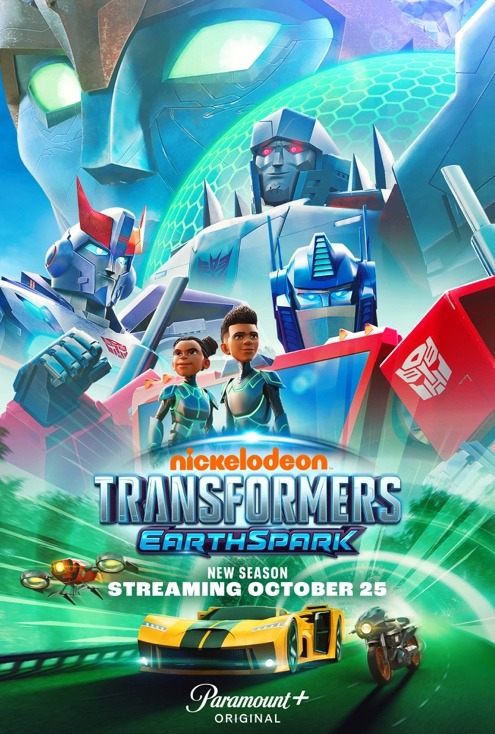
This poster is a lot better than the past main posters they’ve used over and over.
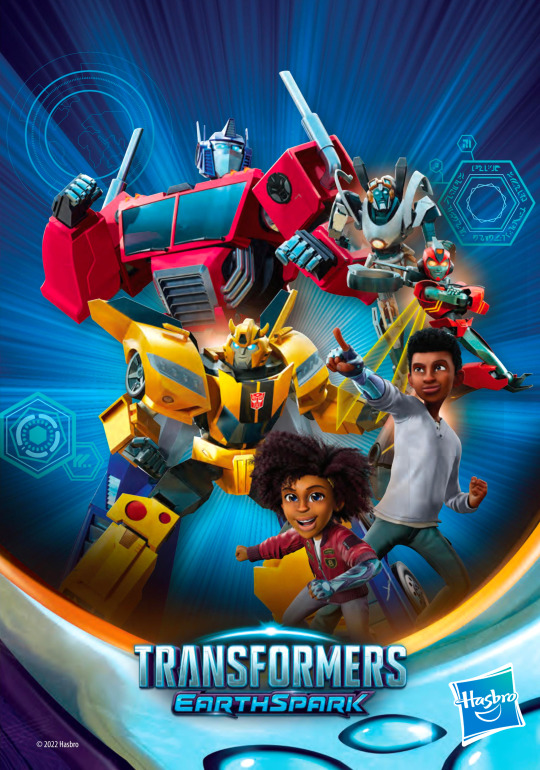
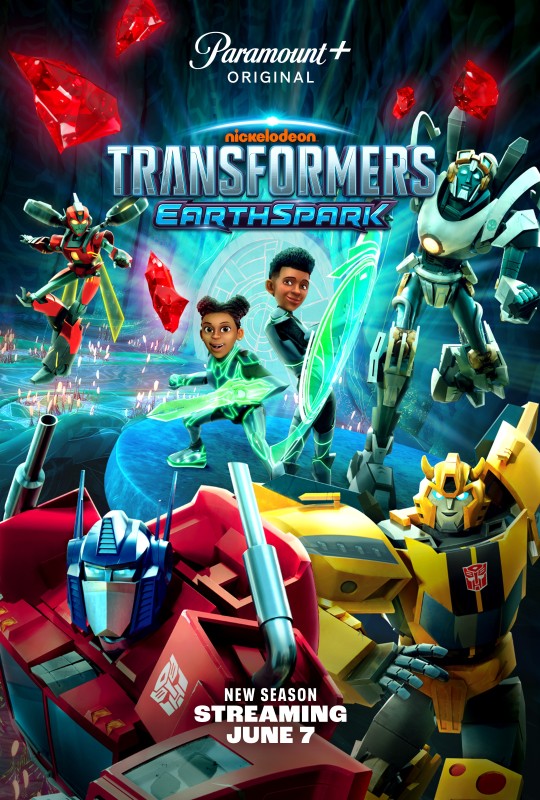
These are better also, but they don’t get used much.
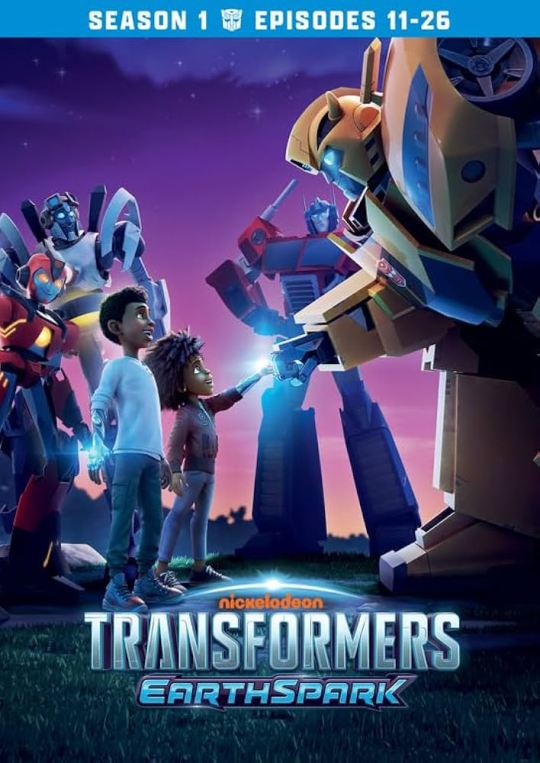
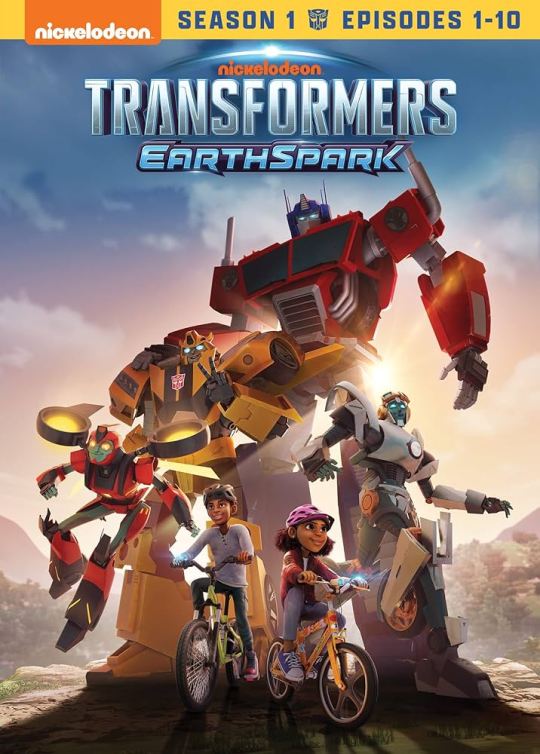
But after RotB & TFONE, I think we can all agree decent advertising isn’t modern Hasbro & Paramount’s strong suit.
As for the trailer itself, it continues a trend I’ve noticed where most EarthSpark ancillary stuff tends to down play the Terrans. Twitch appears for a split second and Thrash appears in a gag where he gets shot… continuing his “just kinda there” vibe.
The trailer primarily focuses on the traditional Autobot & Decepticon conflict, with a big focus put on Prowl, the newest and seemingly only Transformer added to the cast so far.
A news article further describes Prowl as an “old world” Autobot detective who trusts the hard facts & always finds the truth. He is immediately distrustful of Optimus’ allies, so presumably that includes the Maltos, Terrans and naturally Megatron. It’s interesting how he’s specifically described as a detective, perhaps that’s to avoid ACAB allegations I could see the old writers attempt through him….
Prowl’s G1 profiles cast him as a by the books, semi prickly, military strategist. This doesn’t really get explored in the old cartoon, and while it was touched on briefly in Marvel, IDW went hog wild with it, casting its Prowl as a corrupt cop antagonist towards the end of the run. IDW2 cast him as more of a detective pre-war though, possibly where EarthSpark borrowed it from, and while he was still a hard-aft, he had a soft spot for his pet dinosaur-alien.
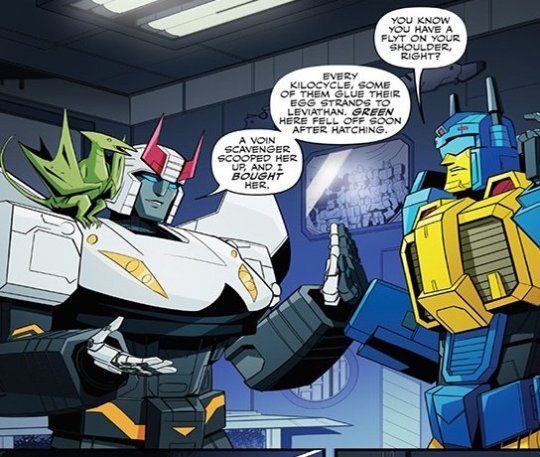
The main villains of the season, unsurprisingly, are the Quintessons. Their leader is a female Judge, who the blurb declares it “is her birthright to possess the power of the Emberstone. She’s wise, dangerous, and her ego is so large that it’s no wonder she has five heads”.
What exactly constitutes gender among the Quints has never really been defined before.
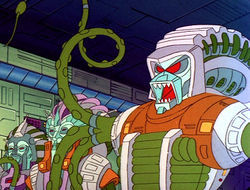

It might be safe to say as far as the G1 cartoon is concerned, they’re an all male race.
WFC & CV attempted to insert female gender among the Judges, having some of the masks speak in a female voice.
That adds another oddity to Judge biology, as the G1 cartoon or Marvel UK comics never stated the other faces being separate personalities, instead other media describes them as different emotional states.
Alpha Q in Superlink did have multiple personalities based on which mask was displayed, each one squabbling/talking amongst themselves.

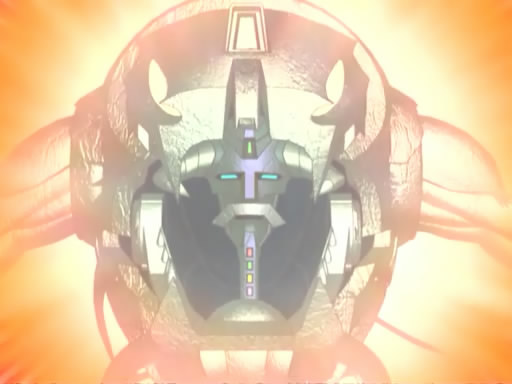
Presumably WFC/CV borrowed from Alpha Q, but the ES Quintesson Judge might be operating on G1 logic, each mask being a single (female) gender, as she has a female voice actor only.
The other big G1 thing the trailer shows is the Hate Plague. The leaked synopsis already revealed it, but like G1, those infected with the plague glow an intense red.
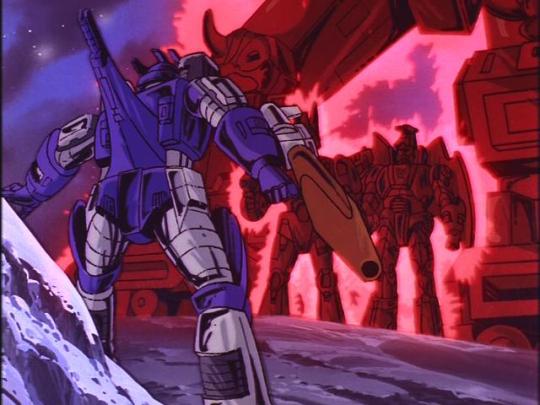
Once infected, they turn incredibly violent and try to kill each other. Despite the G1 show’s violence, nobody actually died ironically, at least it was never confirmed. The synopsis implies the Quintessons unleashed the Hate Plague on the Transformers, and while the 80’s Quints were instead among the victims of the outbreak, they do have a vague connection to it.
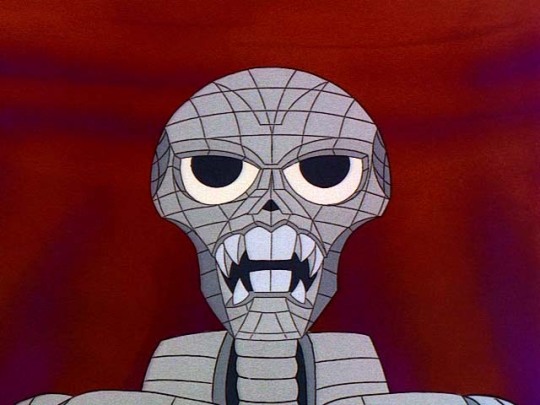
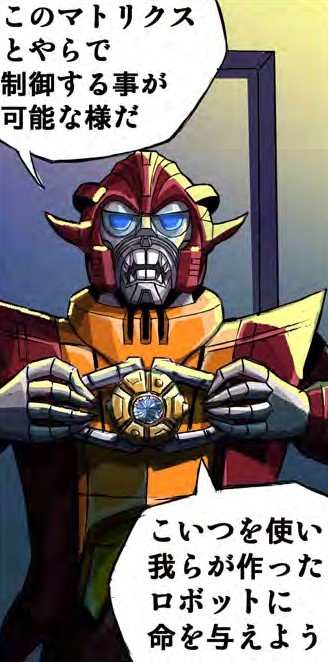
The oldest known leader within the Matrix, only known as “It”, resembles a Quintesson, with Japanese media confirming that’s what they are. Optimus Prime asks this ancient Quintesson how to combat the Hate Plague, with It saying the Plague couldn’t be outright destroyed but contained, where a wise man trapped the spores in a star. The spores nevertheless has a weakness to pure wisdom, so Optimus unleashes the power of the Matrix and uses its eons long store of wisdom to eradicate the virus once and for all… Until it briefly returns in Beast Machines.
As mentioned before, the Hate Plague isn’t exactly a popular concept cartoons like to go back to. Comics don’t like using it typically either, so its inclusion here is both unique but also a little… peculiar. I’m leaning towards it being a vague, modern topical metaphor for something, as an infected Megatron is fighting Optimus in particular. Probably some hogwash about Megatron succumbing to his biases and own hatred, but we’ll see soon enough.
Perhaps the most utterly bizarre detail is the blurb seemingly confirming the return of Spitfire and Aftermath.
How…?
Starscream yanked out their Allspar-er-Emberstone Shards, and the rock itself is dust. You can’t get any deader than that.
The only thing I can guess, is similar to Sari’s key, the Sleeves are the repository of the Emberstone’s life giving energies (the sleeves do just about anything else now so why not), and the Malto kids are incentivized to revive the two Decepticon Terrans for some reason.
MetroTitans in IDW also can grant life and that was carried over to Prime Wars, so it’s possible Terratronus can grant life too, and she restores the Terracons.
Worst case scenario is the two hellions are back up and running like nothing happened, and their death is never addressed again.
Crap writing if so, but the previous two scenarios would be preferable.
Not much longer to wait now. This might be the final batch, as the Quintessons make sense as the final end goal in the struggle over the Emberstone. The show has never been super committed to showing what’s going on Cybertron that whatever Prowl and Cosmos have to add to the matter is probably the best we’ll get. Plus the Terrans don’t have much incentive or interest to even go to Cybertron anyway; Alex would get more out of going there than his kids. Only thing I could guess is the Quints took over Cybertron off screen and that loosely ties into the Judge’s role on Earth, but eh. We’ll see.
33 notes
·
View notes
Text
made a little analysis thread on twitter and thought I’d share it here too if that’s chill ^_^
anyways traffic!impulse using self destruction and the destruction of others as a way to cope with his own frustration and resentment throughout the life series: a messy ramble-y post because I’m crazy.
most of this behavior really only starts after third life. his destructive behavior before then is usually outward and not with malicious intent. instead, he hurt others in third life because he was asked to. it was a part of a greater plan he was undoubtably loyal to and that would later get him killed and tarnish his reputation for seasons to come.
that’s why in last life, he’s much more open to antagonistic behavior (which he barely partook in before and only would if asked of). this mostly includes all the stealing he did that season, the numerous break ins, and of course, spawning the wither. this could also include his personal insistence on becoming the boogeyman and even planning it out in advance (which would later get him killed, his own hubris). he was itching for it to be his turn.
it’s such a huge shift from how he acted in third life, and why? personally, I think it’s because of all the strain and pressure put on him by others and their disdain towards him. specifically the rumors spread about him and the reluctance of others to believe and trust him after what he’d done the season prior. which for some people is justified, like ren and etho, but for others, like bdubs, is not. and this was shown to upset impulse a lot, given how it resulted in him being thrown under the bus, even by his own teammates.
but he’s supposed to be nice and considerate and smart to make up for all he’s done, right? that’s why he sticks with his alliance the whole time and makes a point to be loyal to them and them only. but that doesn’t stop the resentment and anger boiling, and he can only take so much before he has to let off some steam, and destructive behavior seems to be a means to do so.
it turns from him doing bad things because he’s asked to to him doing it because he wants to, to cope. which is why when all else fails and the southlands fall apart, despite him taking the measures to prevent it earlier on, he helps grian spawn the wither, even with the risks and deaths. and he insists on doing it at best’s base, because they ruined him. it gets him killed. he should’ve been smarter.
it gets worse in double life, specifically when homewrecking is proposed. while he’s not the one to bring it up or start the rumors, he soon grows comfortable enough to start talking smack himself. him and bdubs deliberately try to ruin the relationships of others, and they tell themselves it’s to steal away half of each pair for their own benefit, but maybe there’s more to it. maybe they ARE projecting, just like joel had said.
it doesn’t help that impulse is having his soulbound questioned and bdubs “needs” a clock and the horns won’t shut up. when they’re exposed, he takes his destruction to the deep dark. he throws snowballs, he spooks unsuspecting people, he yells into the dark when he finds out his voice can trigger the sensors. throughout the season, he makes multiple efforts to cause distress in the deep dark, malicious intent or not. and maybe it’s to cope with the fact that bdubs keeps sending him down there or etho won’t stop yapping about how bdubs doesn’t want him or how bdubs put a major target on their backs.
and this is when self destructive behavior really starts, too. impulse gives away valuable resources when he realistically could’ve not, he takes risks he absolutely doesn’t have to take (despite how much he values his and, by extension, bdubs’s life), when he’s linked to the fishing rod sequence of death, all he says to bdubs is that it was fun while it lasted. and then he loses their first life trying to get a music disc.
whether he means to or not, he’s slowly killing himself and his soulmate, too. and eventually, by the time he’s red, he just gives in. he starts blowing horn (surely there’s some symbolism there), he terrorizes those better off than him, he wants to cause problems. yet there’s always still some humanity in him that shines through, regardless of his destructive ways of coping.
but this isn’t about that. before the final fight, he even grabs the golden apple him and bdubs had been stashing away, saying if they can’t win, no one can. he would’ve ate it. he should’ve ate it. yet he didn’t, and he died by bdubs’s hand again. more resentment grows.
by limited life, it’s obvious he’s open to dabbling into more chaotic pastimes. bdubs’s ignorance and unwillingness to see his flaws and apologize only fuels the fire. when he’s chosen as the boogeyman, he has a time with it. but he still has the mind to know not to hurt his team, even refusing to use skizz’s accidental death to cleanse himself. but he bombs bread bridge freely, somehow even getting tango and skizz to help him. it’s almost concerning how much fun he has with it.
then of course there’s the complete destruction of bread bridge, which he happily takes part in. and tango’s boogey kill on bdubs, in which he lures bdubs to his demise (something he had been itching to do for seasons). he amasses a huge kill count over the season, his first time murdering anyone since third life.
most of his behavior this season turns more outward, and he grows more keen on sustaining himself the more faith his team puts in him. he is also shown to hold other alliances much less dear than ties, even if they benefit him. this results in the betrayal of many, most notably mean gills in the finale. he fights like hell, he gets his final revenge on bdubs and ends his season, and yet it still isn’t enough.
he begs martyn to kill him, because he’s alone, and he’s scared, and he did all he was asked to do. but they keep him around, despite his pleas. he’s given the illusion of free will, a chance to win, to be given a fair fight. martyn slaughters him in cold blood. a cruel betrayal.
secret life feels like a reset, and most scores are settled, and secret tasks heavily dictate how the sessions go. he isn’t given the chance to cause mass destruction like he could the season prior. he’s not sure if he wants to. most of his mistakes are honest, no self destructive or malicious intent, same with his tasks.
he’s with a team he can trust and confide in. they help him. they care about him. his first two deaths are consensual and willing, something’s he’s never known. the season is rough, but he’s happy. he tries to use his trap as he’s being chased, risky as it was, a final act of stubbornness.
he dies, alone and scared, hearts quivering. nothing’s new. he’ll just have to be ready to cope again tomorrow. get some blood of his hands, whether it’s his enemies or his own.
#mxmarsblurbs#this is just my interpretation btw#impulsesv#traffic!impulse#this is strictly about his character#just some analysis#because why not#he does dumb stuff sometimes and I just wanted to give a method to his madness#3rd life#3rd life smp#last life#last life smp#double life#double life smp#limited life#limited life smp#secret life#secret life smp#the life series#life series smp#trafficblr#idk how to tag this#basically just his overarching narrative throughout the series#clock duo#their relationship is mentioned pretty frequently#I wont tag anybody else though#for everyone’s sake#mars insanity#as usual#trying out fun tags
57 notes
·
View notes
Text
One thing I don't think is talked enough about when it comes to a lot of the antagonist in the series, it's how a lot of them tend to dehumanize/see the demigods as much lesser than.
Not to say the gods don't, but not in the same way the antagonist do I feel like.
Khione(and her brothers) I think is one the most obvious examples to this, freezing and keeping the demigods as living statues is literally discussed hdgdg
Even with Midas, he literally keeps living golden statutes including his own daughter.
At least one of the Giants brings up keeping one of the demigods after they win iirc.
Being seen more like a possession or piece on a board is very common throughout the series. It's definitely obvious with Jason, who's seen as Juno's and Rome's. In a way both Jason and Leo are treated like attack dogs to both Hera and Gaea, it's just Jason's the one Hera could get to heel.
Yet Hera still let's them make connections and walk freely. And she cares enough to grieve when Jason dies. I mean the bar is in Tarturus at this point but hsgdg
Idk. Something is just a lot more unsettling with how the antagonist(like the giants and Khione) talk about the demigods. I think it because they pretty much are claiming demigods like war prises. Which goes back around to something I'm pretty sure I've mentioned before, but the comparison between old versus new. Because, yeah, the gods still stuck in many places, but there's certain aspects most of them had changed in.
For all the demigods that exist, most of them came from genuine connection between the god and mortal parent. There's multiple examples of gods even returning to have another kid with said mortal parent. Many gods seem to think fondly of the mortals they've been with(Aphrodite is outright concerned for Piper's father mental health if he found out about her. )
Not to say that didn't happen in the classics, but there seems to be more of that. Though could be because Rick didn't want to have anything too close to the other subjects in the books. But then he also has antagonist talk about keeping demigods in collections and literally human trafficking so gdgdg
But yeah, there seems to be less kids sired from less then healthy situations. And that also could be because Rick just didn't want to make modern versions of stuff like Achilles' orgins where Zeus had a guy wrestle Thetis down and marry her so her son wouldn't be too powerful. Or any of Zeus' children's origins really.
But the gods tend to have closer connections to mortals and demigods, both hades and Poseidon offer solace in their home to mortal lovers, and don't force it when they decline. Their interactions with mortals/ demigods are down to earth, they only appear to them in full form on Olympus with the other gods or in their realms.
The exception is probably Zeus, who hardly ever comes down from Olympus to talk to anyone.
But he's Zeus, so.
The antagonist however very much address the demigods in a way less down to earth. Making it much more known how powerful they are. Anytime they meet Khione outside her father's place? She's showing off her powers.
The Titans are always large, towering over the demigods. Kronos cares so little about demigods he doesn't even bat an eye when he knocks over his own off the bridge in tlo.
And as I mentioned, many times is idea of keeping demigods as war prises brought up. And that's not new in relation to Greek classics.
The Trojan War was a whole mess of taking women as war prises. Not just Helen being kidnapped but Chryseis,Briseis,Andromache-(honestly, any woman Agamemnon interacted with oh my gods-)
Even men were taken as slaves. It was a normality in war(at least Trojan War wise). If you weren't killed you were taken. Change is important point in each book, how much modern times views being a hero and finding yourself differ from before. How they can mend broken ties and be better then those before them. How they fight for others rather then themselves and pride.
Why the worst antagonist often fight for power, they manipulate and take. They want to be at the top of the world, to be noticed/worshipped. And they do anything to get there.
They see the war as gloryful and a way to reach the top. The demigods see it as trying to live another day. To protect those around them, even desperately trying to save others on the other side.
Idk why, just the whole thing interest me. I think it's also fun idea to explore in a sense.i mean I'm sure there's plenty of Kronos/Giants wins aus, but something about delving into the way that'll effect the survivors intriguing to me.
I think it kinda can be used as a metaphor? At least being looked down on. Feeling like you're being told to dance and entertain sometimes comes with being Neurodivergent. I mean heck, Jason is a walking example of learning to mask so hard you forget who you were underneath. Being dehumanized by those around you.
So something about the heroes fighting help others belong why the villains fight to possess and control everything to their liking feels about right for a series focused on those with disabilities
#mine#pjo#percy jackon and the olympians#percy jackson and the olympians#pain rambles#pjo hoo toa#pjo analysis#Titans pjo#pjo kronos#pjo gaea#khione#ngl i don't know if any of this makes sense#i started this at like 9 something#it is now past 12 am#i hope this makes sense#anyone who's read my g/t fics know how i like to play around with stuff like this#i think my experiences has a lot to do with it#but that's a self reflection thing for me to think about not y'all vdgd#also.#my beef with Agamemnon will always be bigger then my beef with Achilles#how many dang concubines did this man have?#CASSANDRA???#I KNOW SHE WAS CURSED BY APOLLO BUT DID YOU LEARN NOTHING ABOUT TAKING THOSE CONNECTED TO HIM???#and she gets killed too 😭 gods bless her she can't catch a break
26 notes
·
View notes
Note
Im sorry about this i need to rant. I thought things were getting better but Izzy stan Twitter is at it again with their whining, truth bending and self-victimising.
'Do you like OMFD but wish the queer disabled hero didnt die?' IZZY IS NOT THE HERO OF THIS SHOW!!!!! He is at best a reformed antagonist. What an insult to the other disabled characters, and what about the actual heroes of the show??
'We've been betrayed by straight man writing queer stories'. First of all, way to dismiss the other writers. Also, its not his fault you project your personal traumas and mental health on a fictional character on a show with death in the title.
'GB's ending is comphet (?????) because 'we only need eachother' and theyre breaking away from their queer community' ED HAS BEEN WANTING TO LEAVE PIRACY SINCE LAST SEASON!!! also, its progress that Stede was able to resist basic flattery. And David made it clear that they still have work to do. This one truly broke my brain.
Im just sick of all this. Izzy stans have been coddled for the past week, being told its ok to grieve, but theyve crossed multiple lines. I do wish some things had been more explicit in this finale, only because David overestimated the maturity and media literacy of some people.
Sorry for this but i needed to talk to people here. Its beyond annoyance at this point. Im angry and sick of petty crybabies actively working to poison what we've built.
go off anon my inbox is open to your ranting let the rage flow through you [insert palpatine dot gif] but ngl the best thing you can do is just block liberally. block everyone. block left, right, center. do not be merciful. do not hold back. block until the ceiling comes down!!
because like, some of these fans have spent the last 18 months convincing themselves that their little guy was of equal importance to the main characters, the secret third protagonist, and he just got put in a box.
🎶izzy's in a box 🎶izzy's in a box🎶izzy's in a box🎶
izzy was never a hero of this show. he was a villain and then a side character on a rushed arc to redemption for the specific purpose of making him into the kind of man who could apologize to ed for being a shit. but that's hard to swallow for people who were convinced he was always right, so. also let's be honest: they don't give a shit about the other disabled people on this show. a bunch of them were trying to figure out a way for it to be wee john who was killed, and kristian is actually a queer disabled actor. they're just mad it was their little guy who they latched onto.
also yeah like four of the writers are nonbinary people of color, and there's definitely more queer writers on the team, but somehow this was totally the decision of a straight white guy. alright folks come on now to quote your idol pack it in.
gentlebeard's ending is them deciding to give their relationship a go in a more relaxed and sedate environment than the high stress locale of a pirate ship. their friends ARE going to come see them again. just because they don't all live together in the same frat house i mean ship doesn't mean they're suddenly forever alone. also there is nothing comphet about shacking up with your gay lover in a soon to be literal loveshack.
but like you can't expect these folks to care about ed or stede or gentlebeard or anything that doesn't center their white man of choice. the only thing you can do is block because anyone still throwing a fit a week later is simply not worth it.
no need to apologize anon. return to my inbox whenever.
#the izcourse#izzy critical#fandom fuckery#this one is getting those tags to filter out bc i have to tag this with fandom tags to avoid my friends seeing it and getting spoiled lol#ofmd#ofmd s2 spoilers
112 notes
·
View notes
Text

Introducing the Antagonists
BTS Series: ⬅ Table of Contents - Reworking the Plot ➡ Also available on Neocities! P&J Taglist (Check out my Google form to get added): @elegant-paper-collection @auroblaze@zeenimf @vacantgodling @foxys-fantasy-tales Banner art by @auroblaze
With the leads out of the way, it’s high time we talk about the shiny new antagonists for Pride & Justice. And yes, that’s antagonists with an “s” because there are two of them! Since the fanfiction version of the story only had the two main characters in it, both of these antagonists are completely created by me. I also don’t have design references for them yet, so feel free to imagine them in your head.
The reason I have two antagonists when I could very easily just have one is based on a few things. For one, I thought it would be fun to have representatives from both Heaven and Hell, like Pride and Justice themselves, and create a neat mirror effect in the narrative. For another, there are multiple conflicts in the story—the conflict of Pride and Justice getting back to Heaven to complete the contract Pride made with that soul in Purgatory, and the conflict between Pride and Justice as they try to navigate their new lives and eventual romance. The dual-antagonists serve both conflicts, one for the over-arching plot that runs through the story, and another for the personal dynamic of their relationship, creating another wedge that they have to climb over to be together. I also wanted to take the opportunity to say that, while Heaven and Christianity deserve critiquing, just because Heaven is bad doesn’t mean that Hell is good. They’re both fundamentally flawed, for different reasons.
With all that said, let’s introduce the new players!
Honesty
I’ve always been really fascinated with the idea of a villain who believes what they’re doing is righteous and good. The kind of antagonist that is doing objectively horrible things from every perspective but their own, who can’t or won’t understand that the things they’re doing “for the greater good” aren’t doing any good at all. That’s the kind of person that Honesty is.
Honesty is, like Justice, an angel that embodies the virtue of her namesake. She is physically incapable of telling a lie, and follows the word of God to a tee. After all, God’s word is the truth of the world. She knows her place—it is to serve Heaven and fight against Hell at any cost. Every angel in Heaven knows their place too, and deviating from it is a non-issue. If you aren’t serving God, specifically if you aren’t carrying out His word to the letter, you aren’t doing your duty as an angel. You deserve retribution and punishment for it. You deserve to be sent to Hell for it. After all, that is God’s word. You can’t refute that because she can never lie.
In her own mind, all she’s doing is keeping things the way they should be. Angels are taught, created for, and trusted to serve God’s will for the good of His children and the world at large. Pride is a speck to her, a lost cause she won’t even bother sympathizing with. He’s already lost. What really makes her mad, what sends her on the crusade that leads to the entire story, is Justice defending him. He’s breaking the laws he promised to serve, defying God for a demon, of all things. She places herself at the head of the mission to bring Justice back under the banner of Heaven, send Pride to his death like he deserves, or bring them both down.
From our perspective, she clearly sucks. Pride dying would have other far-reaching consequences beyond killing a single demon. Killing the innocent person he just happens to be carrying along with him is bad, actually, and Justice pointing that out shouldn’t immediately send him to the same fate. That doesn’t matter to her. They’ve both made themselves enemies of God by defying His word, and now they are her enemies too. And she’s right. They aren’t following the rules. Pride for obvious reasons—he doesn’t care about God’s rules—but Justice really has no excuse here. He’s an angel advocating for keeping a demon alive. No matter the reason, the ends should justify the means for him. But they don’t. He is wrong, and Honesty is going to show him what happens to angels who are wrong.
The point of Honesty being legitimate in her grievance is not to make a point about how being anti-authority and breaking the rules is always awesome (although it is), it’s to show that those rules she’s enforcing—even if she is telling the truth—are flawed. The law is unjust, and following an unjust law makes you unjust, and Justice won’t sit idly by and accept it like he’s supposed to. The problem with that is that he’s lower on the hierarchy than God. Literally everyone is. To Honesty, the law being unjust doesn’t matter. Things in life being unfair doesn’t matter. Innocent people dying—like killing a soul along with the demon ferrying it—happens sometimes in the name of the greater good. Tough shit. God said so, and it’s not your place to have an opinion about the word of God. Do as you’re told.
If you haven’t picked up on it already, Honesty is going to be the main vehicle for which I drive my criticism of American Evangelical Christianity. Evangelicalism, if you’re unfamiliar, (and I’ll be paraphrasing) is the sect of Christianity that reads the Bible literally, as if it is without fault, and is the perfect way to practice your faith—it’s called “biblical literalism.” One of their core tenants is to proselytize everywhere, to everyone, to save their souls for the second-coming, which they also fervently believe will happen. They genuinely, honestly believe they are spreading the good word—the word “evangelical” comes from the Greek word for "good news"—and saving lives. Which is also why, if you’ve noticed, that they preach to anyone regardless of interest or religion, treat any rejection of Christianity as a personal attack, and why they have worked to criminalize abortion, deny the theory of evolution, lambast same-sex marriage, and in general push traditional (read: conservative) thinking when it comes to authority and social practices. Obviously, this is a generalization of a very large sect of a very large religion, but if you’ve been paying even a little bit of attention to American politics over the years, this specific type of Evangelical Christian is going to sound familiar. It’s what I aim to critique in Pride & Justice, and I have no problems stating that Honesty will embody this way of thinking.
Now, I bet some of you are wondering why I made Honesty a woman (specifically a white woman, but I don’t have a design to show you). Surely if my goal is to critique the traditionalist views of the Evangelical Christians, surely a man in a position of authority would be more accurate? While I can see that perspective, I’d argue that God is that man in a position of authority here. Honesty is—like a lot of Evangelicals in real life—simply the “innocent” white woman who uses her relative position of power to crack down on anyone she sees as deviant. People often ignore the ways women perpetuate systems of oppression like patriarchy, because women are oppressed within that system. But a lot of the reason that patriarchy persists is by women passing down patriarchal standards in their homes to their families, in classrooms, and in public places. If you want to go deeper, it’s well documented that white women will use their relative status to perpetuate racism, homophobia, and transphobia. Historically, white women have perpetuated anti-Black racism by falsely accusing Black men and boys of rape to get them arrested, beaten, or killed. For a modern example, look no further than the rise of TERFs (Trans Exclusionary Radical Feminists), a group that is overwhelmingly made up of white Christian women with traditionalist values fighting against their own self-interests, all in the name of perpetuating transphobia. Honesty represents a real demographic that often gets ignored in the fight against inequality.
I’m not sure I’ll portray Honesty as openly bigoted in the story (she’s not a human, angels don’t really have concepts like gender or race), but she is definitely not a fan of Pride or Justice, and finds the idea that they would ever be in a relationship as at best laughable, and at worst a manipulation. It’s against God, after all, for an angel and a demon to collaborate, much less be in love, so therefore if it’s real it must be destroyed, and if it’s false it must be revealed that it was always a fiction—and therefore destroyed. She is going to try a lot of things to try and get Justice to “see the light" once again, turn him against Pride, and follow-through with her promise to smite him like she intended to before they escaped. All of them will fail, though it will not be without a fight.
Beyond the political stuff, I’m excited to weaponize her inability to tell a lie. It’s really going to add a new flavor to the kind of story I’m able to tell with her, and I think it adds a very cool depth. How do you argue against someone who can never tell a lie? How do you show them they’re wrong, even when they’re technically right, and retroactively make their previous statements untrue? What is the truth, how do you measure it? Is the truth an innate state present in the universe because it’s always been there, or is it a matter of personal perspective?
So, that’s Honesty. Get excited to love to hate her!
Lust
[content warning for emotional abuse, mentioned sexual assault]
Our representative of Hell was genuinely a hard one for me. When I had the idea to create a second antagonist, I knew I wanted whoever it was to be a personal antagonist for Pride. He’s the one with the most emotional baggage that he needs to overcome to let himself be in a relationship with Justice, and the demon crawling out of Hell would obviously only be familiar with him, and couldn’t really have a vendetta against both of them (at least, not at first). Making it Lucifer would be a little much—why would the ruler of Hell care about one demon? I puzzled over the remaining six of the seven sins, debating which one Pride was most likely to have a personal history with, good or bad. Ultimately, I landed on Lust as the one that made the most sense, which made things harder if I’m being honest.
Personally, I despise that lust is even a part of the deadly sins at all. I think that the idea of lust—a real and valid human emotion—being something that eternally damns you is ridiculous and complete bullshit. It necessarily demonizes sex and sexuality as sinful, which has paved the way for a lot more dangerous bullshit, and shunts an entire category of human expression and connection into the Bad Person Slot. Further, I absolutely despise how lust is often portrayed in media—the one, single sexy woman in a conga line of generic looking men in business suits, and of course the one fatphobic caricature for gluttony. I knew if I was going to make Lust-the-character a significant part of my story, I was going to need to do some serious work in portraying it to make it palatable to even myself.
The first thing I did was completely erase the concept of chastity as a virtue. I’ve replaced it with the virtue of passion, something I think better reflects lust on the whole, and I didn’t have any plans to include a chastity angel in the story anyway. Next, I am going to include a plain-text, inescapable, definitive defense of sex and sexuality using the existence of an angel of passion in the story. I already planned to do a subtle exposition dump of Heaven and Hell when Justice is feeling homesick, and that would be the perfect time to bring up something like him being friends with Passion. Probably because Pride was implying that Heaven is all stuffy and no fun. Either way, full and rigorous defense of sex is going to happen, just so everyone is clear about what kind of story this is. And finally, redefining what Lust-the-character actually represents.
Lust is sex doll. The form it chose, and how it presents itself in the story, is as a life-size sex doll, with the addition of smoking horns and a tail like Pride. It does not move its mouth to talk, speaking through telepathy. It can barely move on its own, sitting limp or lying flat, moving in only the barest twitches. If you haven’t picked up on it yet, Lust uses it/its pronouns. It is quite literally a sex object, something that is purpose built for a single-minded, selfish pleasure. It doesn’t matter if Lust enjoys it or not. That’s not the point. The point is that there is this thing that is here for you, and you can do whatever you want.
That’s the kind of lust considered abhorrent and sinful in this story. The kind where you don’t care about, nor even stop to consider, what your partner(s) think. If your sex is not negotiated between all parties, if it isn’t enthusiastically consensual, if you can’t be bothered to take your partner(s) feelings, wants, desires, and pleasure into account, you’re sinning. At best, this makes you a bad sexual partner, using people as sex toys for the sole purpose of getting you off. At worst, you are a rapist.
There are other things people lust for—lust for power is an obvious one. You want to lord over others, to wield your selfishness maliciously, disregarding if and how you hurt others. Generally, though, my version of lust is not about wanting to have sex and then going directly to Hell. In fact, the idea of thoughts = sin is something I’m also getting rid of in this story, but I’ll get into it another time. My version of lust is about being consumed by single-minded desires, including sex, that push you to treat others as disposable. Lust is an object because that’s how people committing this sin view others—tools to be used, abused, and thrown away when they have what they want.
Speaking of “wanting,” what does Lust want with Pride? What is that personal history I hinted at so many paragraphs ago? Well, you may be shocked to find that it isn’t a very nice one.
Like I mentioned in his post, Pride uses his arrogance as a shield to hide the fact that he desperately needs and wants people to like him. As a byproduct of his turbulent past (being rejected by Heaven, burning alive in a river of fire, etc.), he craves the validation of others to tell him that he’s very good and special and the bestest demon guy ever. He’s insecure, put shortly, and will take anything he can get when it comes to attention and/or affection. Enter Lust, who happened upon Pride at the right time, and basically thought, “Oh boy! A body I can exploit!”
There were no real feelings on either side, so what they had wasn’t necessarily a “relationship,” but they were involved, and it was abusive. Lust picked up on the fact that Pride needed validation and decided to make sure he wouldn’t ever be able to get it from anyone else. It berated him for being clingy, insisted no one else would bother putting up with him, and generally fed into the insecurity he tries to hide by confirming it as true. Agreeing that he’s unworthy of the affection he craves so much of, and actually he’s pathetic for wanting so much of it. Ego damaged, Pride would lash out and disappear for a while, but the creeping sense of loneliness from his insecurity would always return. Convinced that Lust was the only way he would ever get attention, he returned to it again and again.
Breaking him down made Lust feel powerful—it had complete control over Pride. No matter how many times he said this was the last time, it knew he would eventually come crawling back. Whereas Pride needs affection to function, Lust needs a power trip.
Eventually, though, Pride stops showing up. This is upsetting for a while, but then rumors start flying around Hell that Pride busted out of Heaven with an angel. And now they’re… living on Earth together? Lust is outraged by this news, in no small part because if Pride never comes back to Hell, it loses a source of its own security. It might lose its hold over him altogether, and that absolutely will not stand. Throughout the story, Lust shows up to try and convince Pride to give up. That whatever he has with Justice won’t last, that Justice will eventually get bored and/or sick of him, that an angel of all things could never possibly tolerate him, much less love him. Some of the other deadly sins show up too, though less persistently, and with a lot less to lose.
EDITOR’S NOTE: I’m toying with the idea of Lust enlisting other demons to find Pride for it, and harass him into coming back to Hell. I didn’t have a reason for any of the other deadly sins show up, but this would give them a purpose: annoying Pride—on Lust’s behalf, probably for some sort of bribe—to make sure he doesn’t think he’s all that just because he shacked up with an angel.
Lust’s role in the story is to serve as a representation of Pride’s insecurity, and the abusive relationship he has with himself sometimes. Pride routinely denies himself the ability to be vulnerable based on his ego and believes he won’t be worthy of love if he is vulnerable. Defeating Lust is a metaphor for him overcoming not just his past abuse, but his feelings of insecurity.
In a weird way, I am excited to write Lust. It’s going to be a creepy-horror-movie-haunted-doll type of character, which is a way I don’t think people expect a “lust” character to act, so I’m interested in seeing everyone’s reactions.
Also, an important note! Lust is not going to be the only it/its pronoun user in the story, I am not unaware of how that looks. I’m still creating all the side characters, but since Justice makes a lot of friends on Earth, I am fully planning on populating the most-seen characters with at least one other it/its user.
Anyway! Those are the antagonists of the story! What do you think? I’d love any and all thoughts!
Thanks as always for your support!
— Annika
#original writing#original fiction#original character#original characters#spilled ink#writers on tumblr#writeblr#writeblr community#annika talks#P&J#Pride & Justice#P&J: Worldbuilding#Honesty#Lust
18 notes
·
View notes
Text
Fuck it, it's reset Tuesday. I will go in depth on why Saladin should have stayed racist.
Disclaimer first: Season of the Chosen is one of my all time favorite D2 seasons and I think the first one that led to a string of truly incredible seasons and stories in Destiny. In fact, I think the decision to have made Saladin return to the narrative the way he did was fucking fantastic. I loved it. 9/10 season all around
But it was laying the groundwork for something else Destiny would, in my opinion, over utilize in the coming seasons and moments of character writing.
Now Saladin didn't start off, like, explicitly racist towards the alien races because that wasn't even a way we could view the enemy races within the structure of the Destiny universe. He was just an old guy who lived through the horrors and had humanity first burned into his Light, seeing anyone else pretty much rightly as a threat. So when they wanted him to voice his opposition to Caiatl with the knowledge of her eventual allegiance with us, they started to use language and lines of thought similar to the prejudiced in real life. It also made us all much more willing to listen to the Cabal. By bringing in Saladin and making his behavior and actions more analogous towards actual actual racism or discrimination, we can sympathize with him while also knowing he is inherently wrong in the eyes of the story.
But it began a trend of Destiny realizing they could do things like have old characters grow or develop. And as cool as this might have been over the course of Destiny, better late than never. Except... characters only develop in one way. Like Saladin, the negative traits they hold are brought to the forefront and in more obvious language analogous to real life oppression, trauma, mental illness, or whatever. Like Saladin, the narrative clearly paints them as being deeply in the wrong even if sympathetic. And like Saladin, they have to change if they want to follow the Vanguard's platonic ideal of banding together to fight the Darkness.
This has led to characters in the recent years all going to the same therapist and talking the same way about themselves when they are prompted to have their spiritual strip down in front of the Guardians, and only getting better. But not just better- better in a way wholly convenient for the Vanguard and therefore the story. Once Bungie signaled their desire to have a climax that involved everyone banding together to take down the big bad, I wasn't a fan as it felt cliche but understood. A side effect I did not foretell was that all these characters who were maybe once threats or oddities or just people with their own nebulous motivations would be made to transform into much more agreeable versions of themselves.
So here's my examples: Drifter. Eris. Mara. Osiris. Ana and Elsie Bray. Rasputin. We reached through time itself to do the same with Uldren and Ghaul. All of these characters had multiple moments where it seemed they were suddenly dragged out of lore, put before us, and made to repent in some way. And, incredibly, it was all mostly in the exact same chunk of time. I mean Ana, Elsie, Osiris, and Rasputin all bore their souls during the same season. Eris, Uldren and Ghaul were two seasons prior, and Mara has literally not stopped apologizing since she returned to Sol. And I do think a lot of these characters have aspects of themselves worthy of examining and growing from.
But... all of them? In the same way? And more importantly... for what purpose?
Rasputin, Ghaul, Uldren, they're easier to understand: efforts to humanize characters who were powerful and antagonistic towards us, to "soften" them because they were/are inextricably tied to other people in the main cast. Rasputin needed to soften so Bungie could kill him and stop having him creating plot holes just by existing at this point in the story. Uldren and Ghaul needed to soften so they could continue to bring up the characters in relation to Crow and Caiatl without pissing people off. Again, this isn't to stay all this development was bad or unwarranted, just that it's always deployed to follow similar goals of tamping down uncomfortable or divergent characters.
Mara keeps getting melancholy lore entries written about her because no matter how often she apologies and bemoans the things she's done, she still did them and is still taking the same path those actions led her down anyways. And yet they keep revisiting it. Osiris had this moment of strong development in the season of Rasputin blowing up, but it got sharply reversed in Lightfall and then took effect again. Season of the Wish is right now and Osiris has ANOTHER lore entry here about how he's too stubborn and overworks himself and is too involved in Strand. Ana, Elsie, and Eris, frankly, had nothing wrong with them. But they were people with their own goals and desires and theories on how to fix the looming Darkness situation and were divergent from the Vanguard. So we make them "grow", speak their heart's desires in weirdly plain language, and pushed in those pesky attributes that made them even a bit nuanced.
And no place is more clear than Drifter, who was relegated to the backseat of lore for years despite incredible popularity and having a pretty strong focus in the story, so that he could be changed. I don't think I even needed to explain how vast the difference is in the Darkness peddling snakeoil salesmen charmer grifter liar son of a bitch we once had and Eris's boytoy now. Drifter got powerwashed squeaky clean and, once it was done enough, he's been back in the Seasons joking and yapping and being apart of the main cast again.
So what's my point here. Why should Saladin have remained racist? I think it's because obtaining peace with uncomfortable people and uncertainty for what comes next is not only more realistic, it is also what makes a better story for the present and future to come. Why are we reducing all of our threats down to those on the edges of our periphery? Why is it so important everyone proves themselves morally sterile before marching into the finale? I think it's just because it is easier and once characters have been simplified down enough, they become easier to write a lore piece for every three months so your community doesn't forget they exist.
I think it would have been more interesting to see Saladin forced to grapple with his feelings, swallow them down for peace, and then maybe continue the conflict in other ways both before and after TFS. I think the same of everyone else. I think it's a shame to reduce the most interesting traits of characters, while not fully committing to developing them, so they can be properly molded for plot events to come.
13 notes
·
View notes
Text
Absolute Brain raaaaawwwwwttttt
Klassje is like Harry's Virgil, his Shadow The Hedgehog, Jetstream Sam. In a gameplay sense, she's the rival character. The one always just a step ahead of you until your big confrontation. In that "Not really a villain" category of antagonist. Like there are certain characters that while morally complicated, still fill the villain role in terms of stories and games. Joyce, Evrart, Dros, The Krenel Mercenaries, they're the closest things DE has to traditional villains and do fill that role. Observing the story and characters from that lens, Klassje is the rival antagonist. Almost a villain but too much like you, too friendly with you and vulnerable to you. They're someone on your level, and a test of your skills, quite literally in fact.
Klassje as a character puts to the test what kind of cop you are by giving you the option to arrest her or let her go, arresting her may lead to her being caught and killed, and letting her go gives post-Tribunal changes that are beneficial. She's also a foil for Harry, like she's an attractive skinny young white blonde woman who smokes, like Dora right? But she's also a self described "Disco Holdover" and is using a fake name, getting pilled up to avoid her worries, she's like Harry. She knows it to, knows it better than Harry does just how similar they are even though they find themselves on such different sides. She's the rival character! The foil to the main character and mid-game test of your skills and priorities. She's also one third of the murder case. The other third is the hanged man, which I'd also say kind of fits the role of rival character in that, Harry obviously sees himself in the hanged man. Not in Lely, not in the person who was once alive, but the bloated corpse of that person, the victim, and it's also an early game obstacle you have to deal with, combat in a way.
Of course the writing is more complicated than "Here's our party with the Leader, Tank, Emotional Support, Lancer, and our Main Character Mirror Rival Character" it's much more in depth and complex than that, but also interwoven so no character is entirely really their own character, they're pieces of everyone else's life and everyone is caught up in their stories. They're all the main character because they're written like their own characters that their own story revolves around. Hell you can feel more of a side character in the lives of all these complicated people even as the player. The Working Class Woman, Billie Méjean, is a perfect example of that because she's like the archetypal video game NPC side-side-side-character who you harass with your main character shenanigans, and she gives you 2 quests, the Spirit Bird quest and the Missing Husband case, the Missing Husband case in particularly is incredibly humbling because it goes from making her a side-character/quest giver into just an average, complicated and living person. Puts you and Harry in a kind of awkward and very real position where you only have bad news to offer.
Disco Elysium isn't just an awesome game, it's a loving subversion of RPG tropes, of power fantasy and of players and non-player characters, and it uses the set up of a game and those expected tropes to constantly subvert you because it reminds you both simultaneously "This is practically a living breathing world" and also "This is a game and a written story" without compromising either, by making them part of each other. It does this by disguising video game elements in people and set pieces. Jean Luc is a wall you have multiple ways of getting around, Evrart Claire and his chair is a boss fight, the Insulindian Phasmid is the final boss, and the final boss is just talking to a bug but it is the final boss and Dros is its first phase.
Disco Elysium is several books, literally several books in a game, but it is also an incredible game because it uses the roots of RPG's and infuses them into something completely different from any RPG you may be deeply familiar with. The dragons and castles and princesses and knights that inspired the genre have been spun into abstract forms and then into grounded realistic depictions of people and concepts. It isn't just a book disguised as a game, it's gaming taken full circle. Books used to be games, and now the game is a book games inspired by gamebooks that inspired by books.
It kind of reminds me of Undertale but in a much less obvious way. Undertale is as the youtuber would title it "A Subversive Masterpiece" because it is. It's a subversive commentary on our relationships with games and the stories in them. We all know monster kind are the victims now, but did we expect that going in? Because it's presented in the prologue very apolitically, deceptively apolitically, and uses your biases set from other games to expect the monsters to be straightforward enemies, not genocide victims! It's subversions all the way, by ramping everything up to be super gamey and then twisting it around. It takes every chance to fuck with your expectations without breaking your investment. It's all about you to, you're the star of the show and that makes you kind of uncomfortable. Even though you're the star though, your player character is almost characterless, almost. Whereas in DE the world is almost painfully indifferent to you, every character is all fleshed out and has a lot going on with them and you don't even know your name. It slowly takes you out of your place as "The main character" and breaks down your main character syndrome by making the main character just a character and every other character just as complicated and interesting, not more or less so. It subverts you too, without even really trying just by being so unique, and when it really starts to feel like the world is cold and indifferent to you you realize you have a friend and you hear the very spirit of the world you're in say I love you and it's beautiful because you don't expect it, you don't expect such heart touching things from such an otherwise cold and gross experience. You're made not to expect it!
Disco Elysium and Undertale are Opposite But The Same games to me, they're games about games and games about life in opposite ways to each other. They're great games, story games, art games. The most a game can be, and still not even yet the pinnacle, proof of concepts! Disco Elysium may never get its Deltarune though...
All in all, Disco Elysium is a great game.
3 notes
·
View notes
Text
I have a lot of reasons for not believing that any of the prisoner's murders are indirect.
One of them is because I've read Yamanaka's other works and am not taking a light novel written by a different author as gospel. Ya know, since the novels are based off the concept by Deco and Yamanaka but authored by Namitsumi. At least according to the book, it is.
So, let's talk about the murderers Yamanaka is on record writing for before Milgram-
Spoilers for Caligula Effect Overdose below the cut. I am just beginning 2. So, I can't speak on that.

The murderers that Yamanaka has written for previously have-
First Murderer
A. Used their position as a lawyer to extort money from the elderly and disabled.
B. -Implied but not confirmed by the narrative- That when they were found out by their father whose law firm they were working under they killed him and took over the firm.
C. Extorted a client they'd gotten an innocent verdict for into killing one of their other clients that had proof of their embezzlement. Stating that since the client got off due to a plea of insanity it was incredibly easy to have the verdict overturned. The client proceeded to burn down the home of the embezzlement victim, leading to the death of the client who had said evidence, his wife, and later his eldest daughter.
The kicker, the evidence of their embezzlement, had already gone to court. They literally had the guy do this to be petty and send a message.
Like this is what happens if you snitch and there's not a thing you can do about it.
D. While they knowingly had someone going to kill this client, they went and flippantly displayed their ill-gotten money buying drinks and chatting up people to create an alibi for themselves when it came to the murder.
E. They are only in the game to escape their prison sentence since the thing they hate most is being locked up and kill the client they pressured into committing murder. Because their prison release date is coming up and they don't want to risk this person talking causing them to be incarcerated again or using this information as blackmail.
F. The least of what they did but literally lied under oath. Plus, it is stated that they bluntly mocked the only surviving relative of the family. They did this by smiling and chuckling as she attempted to give testimony through tears. Since her sister had just passed away in the hospital, succumbing to her severe burns. The surviving relative tells you this in game.
The player can literally choose to cover up and blatantly ignore their crime by not finishing their social link and minding their business when asked to. This leads to them committing murder within Metaverse Es and going back to reality and being released from prison having served most if not all their sentence while in a coma, or a different character dying depending on the route.
Second Murderer
A. Abducted people. They abduct another character and pretend to be them through their phone to make them seem like a traitor.
B. Threats of violence.
C. Psychological manipulation. Has manipulated people usually friends or friend groups into turning on each other for kicks. Because they believe all human relationships are inherently fake and that once the relationship no longer benefits the parties involved people will turn on each other.
D. Their social link is literally them committing crimes and trying to see when the player will be like hey that's bad- if the player chooses that sort of option, the social link could be destroyed.
E. At a point, they assault what is implied to be an elderly couple in an attempt to murder them. Because their displays of love towards each other is making them sick.
F. Aides the protagonist and antagonist in destroying the world through cyber terrorism. Leading to multiple places being nuked within one of the endings of the game and the deaths of millions including themselves.
Yamanaka knows what the fuck murder and crime is very clearly. So, if the prisoners are being called murderers, they are all that. The only thing changing that definition is our individual interpretations and the justifications we come up with for them.
Hence Undercovers line of,
"“UNDER” If you say INNOCENT, you’re complicit and weak I’m so lonesome, please love me."
And the previous line that some like more of,
"“UNDER” If you forgive this sin you’re as good as an accomplice I’m alone and lonely."
These guys could be as good or as bad as we want them to be.
Yet, there's no doubt in my mind that they all are murderers by the basest definition of the word. They killed someone with their bare fucking hands even Futa's admitting it now.
Trial 2
Q.06 Do you remember the name of the person you killed?
Futa: I'm pretty sure I do. I saw it often after all.
Vs.
Trial 1
Q.09 Do you want to apologize to the person you killed?
Futa: I didn’t kill anyone! Listen to me! Aren’t you supposed to be a guard.
Also please play Caligula Effect- the combat system is incredibly fun, and the music is nice. Though some of the characters can seem cartoonishly evil at times.
9 notes
·
View notes
Text
while there are another characters that gives me levi vibes for various reasons, there is one in particular that i would like to mention.
jonathan sims, head archivist of the magnus institute.
granted levi and jon are not entirely similar, what with the difference in background and world, but as the first campaign continued and levi’s backstory was slowly revealed to me i couldn’t help but feel that way.
further explaination below the cut (spoilers for tma btw - i know majority of the people here are caught up but just in case)
they’re protagonists who become victims of mental manipulation caused by their respective antagonists
jon being controlled by “elias” to perform the watcher’s crown against his will, levi getting his mind tampered with and his memories sealed by “zegal”
2. they’re hopeless romantics and absolute idiots when with their partners (said love is their strength but also their weakness)
jon with martin, levi with selki
3. they have no concept of self preservation whatsoever
i can think of so many moments with jon, levi? HOO BOY
helping people out after just barely surviving a fight multiple times
nearly shattered a shard of glass that held a piece of a god whose power is the magical equivalent of a nuke to scare zegal (it worked)
stabbed himself with said shard thinking that his body would absorb their power so zegal wouldn’t get his hands on it (it didn’t work but he did get a chance to talk to said god for a moment)
being willing to punish himself if he does something he thinks is wrong (losing control of himself and/or his devil magic and hurting someone in the process, upsetting someone, getting someone hurt or killed by his actions and decisions, breaking a promise)
being willing to die if it means the future would be brighter and the people he loves are safe
throwing himself in front of someone to defend them from magical arrows
swooping in to save a kid from a monster without a second thought & attempting to rush into a army by himself while none of his teammates were watching
4. they have the tendencies to seeing themselves as ‘monsters’ and are the first to blame themselves for things that weren’t their fault
jon develops this later on, levi does too (he does stop towards the end of part 1 and gets better in between parts, but now he’s doing it again)
5. being willing to jump into places that can and will mess with their minds to save their partner
jon going into the lonely to save martin, levi journeying into the abyss to save selki (and icarus’ ex gf now friend tris)
6. they have connections to god like beings
jon with the beholding, levi has quite a bit (the raven queen, torm, oberon) but mainly two
his pact with zariel (they’re also related)
his bond with toto (aka the original sin aka the god i mentioned earlier)
7. they have glowing eyes and do cool voices when they channel their more godlike side and/or their powers take over
jon with his archivist powers, levi with his celestial instincts
oh and one more thing
they’re both their gods' special little boys and their universes’ favorite punching bag
#klonoa chat#dnd#levi hughes#jonathan sims#tma#really long post#cw: self harm#just in case#tma spoilers#also just in case
0 notes
Text
Okay I'm about to be very opinionated and that's because I know and love both couples. I first read LotR at age 8 and shipped gigiolas before I knew what 'shipping' was; I have 6+ pages of just TYK meta on my blog, before we count the art and the fic and the shitposting. I adore both! But.
In being a murder couple? A gay wrongs couple? Wenzhou absolutely take the prize.
Yes, gigolas have their cute af murder competition, but they are killing bad guys. In battle. Meanwhile Zhou Zishu murdered multiple children, and Wen Kexing used to kill people for standing too close to him. That's before we get into Zhou Zishu creating a spywork&murder government agency, and Wen Kexing's revenge plot with body count in the hundreds, and Zhou Zishu's literal, actual, honest to god warcrimes, and Wen Kexing either skinning or dismembering the previous ghost valley master alive.
And if we wanna talk about wenzhou being cute and murder-y together, there are so many moments of Wen Kexing being absolutely smitten by Zhou Zishu's ruthlessness (Zhou Zishu: murders someone. Wen Kexing: kisses him on the cheek complimenting his swordsmanship. <- actual scene from the novel), and then there's of course Zhou Zishu's total acceptance that sometimes a guy needs to murder a few hundreds people, and just going 'well, i'll come pick him up after' when asked... yeah, they are pretty much villain4villain in all but narrative roles. Also, they often criticize actual antagonists for being less competent villains than they themselves are, it's hilarious.
Anyway, tl;dr: both are great couples. both are very canon (i mean, gigolas didnt get distracted while spying on an antagonist because they were too busy making out, but Legolas did smuggle his dwarf bf into the Undying Lands!). both were done dirty by adaptations. but as for which should be winning a murder couple / gay wrongs competition? I think we gotta give it to the cannibal x assassin ship, not the guys literally saving the world.
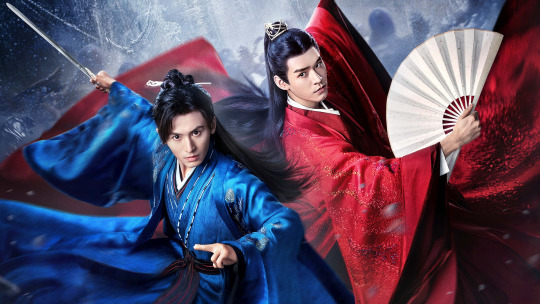
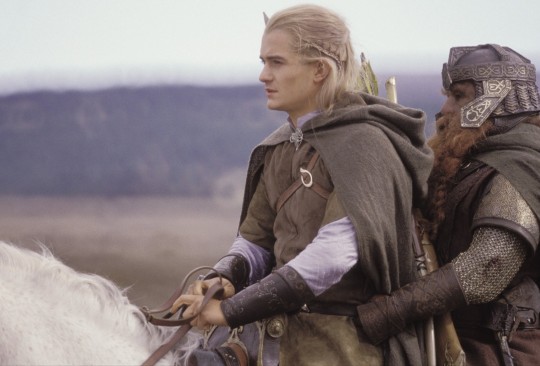
Gay wrongs tournament, semifinals of the losers bracket
Propaganda:
For Wen Kexing and Zhou Zishu:
you've got the founder of the fantasy ancient Chinese CIA and the leader of what is essentially the mafia and then they're soulmates and in love. they're both willing to kill anyone who dares hurt the other while also just wanting a soft domestic life together
Zhou Zishu is an assassin and spymaster who put the current Emperor on the throne, and then quit his job by faking his death (kinda, hes still dying but not as fast as he was supposed to). Had done A Lot on his old job, including murdering children (more than one, and at least one of them in a way I can't even describe without several trigger warnings), exterminating whole families, war crimes (and i dont mean this in a buzzword way, i mean "organized a public execution of foreign diplomats during war time")… btw he doesn't feel particularly bad about any of this, because he believes it was necessary. Like he wouldn't do it for fun, but he thinks the ends (putting a good Emperor on the throne) justified the means (all of the atrocities). As a retiree, he definitely cut down on the amount of morally reprehensible murder, but not murder in general. He still routinely kills ppl, he just doesn't go out of his way to kill more. Wen Kexing, meanwhile, is the Ghost Valley Master - Ghost Valley being a place where the worst of criminals are exiled. Even in such a place, he has reputation as a complete lunatic, owed partially to the fact that he either skinned a man or fed him his own flesh or both at one point, and partially to him having a rule where he would kill anyone who came closer than 3 meters to him. But in truth, everything he'd done was to survive the Ghost Valley and eventually take revenge for his parents, who were brutally murdered when he was only nine. By the start of the novel's timeline, he put his plan in motion - the plan that would drown jianghu in blood, but also deliver poetic justice to all responsible for his parents' deaths, as well as all who'd commit the same crime given the chance. And these two men, these two murderers and schemers, meet - and unexpectedly, find in each other the person who /understands/. The person who is just as ruthless and whose hands are just as bloody, but also the person who knows standing at the top of the world is not worth it, who seeks the same freedom of leaving it all behind, and who is still, underneath it all, a human, with human heart seeking connection. So you have this couple who understand each other with barely a word, and who want the same things - who are so hungry for domesticity and for people they can just goof around with when all their lives they had to measure every step and word - but ALSO where one half a couple is like "i gotta go murder hundreds in revenge" and the other half is like "ok pick you up at 6". (This btw is why I'm submitting novel's iteration of the couple in particular. Show wenzhou with their ridiculous breakups over morality could Never.) Also they were both hiding who they are when they first met, and later flirted about having figured each other out. Finally, I'll leave you my favorite quote that just. perfectly sums up their relationship: "And just like that, they fell asleep in each other's arms, steeped in the smell of blood."
You’ve probably already had submissions for them but I’ll add on. One of them founded an assassin’s guild and killed a staggering number of people. His malewife is the leader of a sect of insane murderous outcasts, and he attained his position by proving to be the most crazy and murder happy of them all. Most of the plot involves him wandering around watching his schemes get more people killed. Together they adopt a kid that was only orphaned due to said scheming (oops). They’re terrible and I love them.
For Legolas and Gimli:
They literally have a running competition between the two over who has more kills. And non-canon my ass, Legolas took Gimli to valinor
They kill alot of orcs together. They make it into a competition. Better minds than i have spoken about the couple ness
141 notes
·
View notes
Note
why do you ship chell and glados if glados is basically her mom
Okay this is actually a pretty common misconception in the fandom that unfortunately a lot of people have taken as canon, but I’m feeling nice so I’ll answer your question.
Basically, anon is referencing a theory from around 2012 that Caroline is Chell’s mom. The evidence for the theory is as follows:
- The turret opera calls Chell “bambina”, which means “little girl” in Italian
- Chell’s name can be found on a Bring Your Daughter To Work Day science project
- GLaDOS references the possibility of Chell being adopted multiple times
- GLaDOS is significantly nicer to Chell after discovering she’s Caroline
And, anon, you’re right, it does sound like a pretty good argument at first glance. The problem is that a lot of these points don’t actually hold up to scrutiny.
For example, although “bambina” literally translates to “little girl,” it’s often used in the same way “baby girl” is used in English - it can mean child, but contextually it’s usually a flirtatious term. (Source: Cambridge Dictionary)

For Chell’s science project, it doesn’t work as evidence for the theory because GLaDOS killed the scientists around 1998-ish, when Caroline had presumably been uploaded several years earlier and Cave was already dead. Also, Chell’s in her 20′s, and since we know from Lab Rat/Portal 2 that people don’t age in stasis, and that Doug put Chell at the top of the test subject list only weeks after the takeover, Chell was 28 at the time of the takeover. The science project is really only an Easter egg and doesn’t actually fit into the canon timeline let alone prove anything about Caroline and Cave.
GLaDOS talking about Chell being adopted is a pretty strong point, I’ll admit, but also it’s important to remember that maybe half of what GLaDOS says is true. And even if we take what she says at face value, she also says there’s a man and a woman in stasis with Chell’s last name, which could not have been Cave and Caroline because they were already dead at that point. And the official book Final Hours Of Portal 2 confirms Cave and Caroline were not married and could not have shared the same name anyway. It was also the 50′s, an an unmarried couple of two likely famous people having a child would’ve been scandalous, and yet we see no hint of something like this affecting their company.
Also, although GLaDOS is nicer to Chell after the Caroline reveal, that’s not necessarily indicative of a mother-daughter relationship, and neither is any of their interactions. It’s just. GLaDOS being friendlier.
Finally, when this theory was made (and let’s be honest - it still is happening) Chell was constantly whitewashed to hell and back.
Chell is Japanese-Brazilian, and Cave and Caroline are white, so it would be a near impossibility for her to be their biological child (and insisting otherwise is kinda. just. whitewashing). And although people will cry “adoption!”, based on what I’ve previously proven, that’s pretty much impossible. This theory that somehow she’s Cave and Caroline’s daughter erases an important part of her identity. [Disclaimer, I am white, but this is what I’ve heard from around the fandom]
With all that said, the idea that she’s the daughter of Cave and Caroline really doesn’t hold weight when you really analyze the canon. It’s surface level analysis that doesn’t hold up. And honestly? The idea kinda cheapens the story. It’s much more powerful that GLaDOS learns to care about Chell and becomes kinder than just. Oh, she remembered she’s related to Chell.
But to actually answer your ask.
Why do I ship them?
Well, they aren’t mother and daughter, I think that’s pretty obvious now. But if you actually look at a lot of subtext in Portal 2, without the lens of the mother theory, it’s actually pretty romantic!
I know that sounds ridiculous, but bear with me!
Now - it’s totally okay if you don’t ship them. I get it. Their interactions in Portal 1 and the first half of Portal 2 are toxic if not outright well. Y’know. Murderous. I completely understand why that turns people off from shipping them, and ultimately, shipping is a personal thing. To each his own.
But before you judge me, let me present my case.
Exhibit A: Portal
Portal is kinda gay. No, really. Chell and GLaDOS are enemies in this game, but the entire focus is on their relationship (good or not) and the power struggle between them. They are opposites, two sides of the same coin, different representations of opposite ideologies. People have analyzed Portal as a relationship metaphor, or as a metaphor about women’s role in society - either way, the heart of Portal is the complicated dynamic between Chell and GLaDOS.
That’s not necessarily enough to code a romance, but a lot of popular (and especially popular queer ones) ships begin with opposite ideologies, symbolic powers colliding. Portal cements their relationship as a toxic one, something on the verge of falling apart and hurting both parties in the end. The ending image, of Chell and GLaDOS side by side after the battle, reinforces the symbolic parallels between the two.
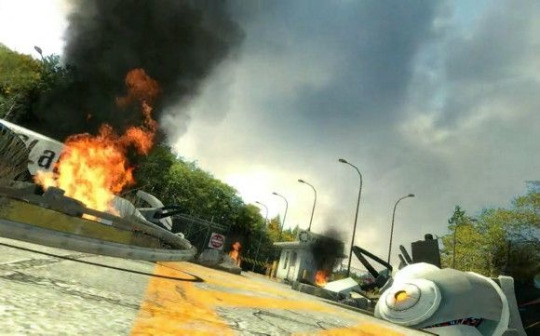
The companion cube is also pretty symbolically important to this interpretation. It’s literally a representation of someone’s heart, and you are told to protect it and preserve it under GLaDOS’ orders, and then you have to destroy it regardless of how you actually feel about doing that. You are destroying GLaDOS’ heart, so to speak.
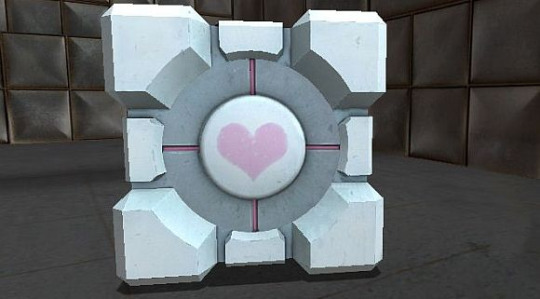
There’s also the ending song, Still Alive. The lyrics speak for themselves.

They hint that GLaDOS’ feelings about Chell are more complicated than they may appear (if she’s not being sarcastic...) and she literally talks about Chell breaking her heart (also, think back to the companion cube. Yeah.). The entire song is structurally similar to many a breakup number, with the laments of “I’m glad it happened, but also leave.”
At the end, we also see that the long promised cake GLaDOS was supposedly lying about was real the whole time. Before Portal 2 came out, it was mostly interpreted as a stinger ending (along with the nicer lyrics of Still Alive) to make you question GLaDOS’ true motives and intentions.

She actually did have a real cake waiting for you. (Side note - not really evidence, but in Argentina, “torta” means cake in Spanish. It’s also a slang term for lesbians. So. Do with that what you will). The cake is what GLaDOS offers you to lull you into the sense that she cares about you, so discovering that “the cake is a lie” wakes you up to the realization that she doesn’t. Except then the idea is subverted one last time, at the very end, showing that the cake is real and at least some of what she said she meant.
You also see the companion cube. You know, GLaDOS’ symbolic heart?
Now, okay, you might be thinking I’m extrapolating a bit too much. And you might be right. But Portal is not the only game in the series, and if you’re asking me about Cave and Caroline you obviously know about Portal 2.
Exhibit B: Portal 2
If you thought Portal was gay, Portal 2 turns that up to 11.
Even before GLaDOS wakes up, you’re treated to some visual subtext. A few of Rattmann’s drawings representing the events of Portal 2 focus a lot on the relationship between GLaDOS and Chell, with more of the cake symbolism.

In this, you can see a face layered on top of GLaDOS. This could be foreshadowing about Caroline, and likely is, but also resembles his other drawing of Chell. It insists that Chell is a part of GLaDOS, or reinforces parallels between Chell and Caroline, hinting at something either way.

In this picture, we also see Chell standing on top of GLaDOS, in the same position where the overlay of the feminine face was, again referencing the parallel. It also presents them as opposites, fundamental parts of the same thing and both connected to the same basis, but on opposing sides.
When GLaDOS wakes up, she returns to her antagonistic role, but there are more hints to something deeper just like in Portal.

Here, in her awakening lines, she references Chell not unlike an estranged ex. Also worth noting that GLaDOS is pretty much the personification of testing (in a sense, she is testing since she can control all of Aperture like an extension of her body), and insinuates that Chell loves to test. And that she reciprocates that feeling.
In test chamber 10, she says this:

It’s supposed to be threatening, but it does read as almost... sentimental.
There’s also another chamber with companion cubes in Portal 2. I already talked about their symbolism in Portal, and the same pretty much applies to them here. However, GLaDOS says something interesting about them during this level:

Once again, meant to be intimidating, ends up coming off as “well, GLaDOS, why were you going to give Chell a heart shaped representation of yourself that says ‘I love you?’” And you might think I’m stretching the GLaDOS’ heart metaphor thing a little far here, and I might agree, if the companion cubes didn’t literally sing Cara Mia for you.
Cara Mia is the turret opera from the end of the game, which is all about how much GLaDOS cares about Chell. More on that later. But the companion cubes play a song called Love as A Construct, and when you get close to them, they sing a specific part of the song that has the tune of Cara Mia. These things literally exist to sing about GLaDOS’ feelings.
Which makes this line a lot more. For lack of a better term. Tsundere-ish.

Then, right before the escape, she starts talking about the confetti from her fake surprise.

I really don’t have to explain this one. What else does GLaDOS consider an inconvenience but might miss anyway? Or, more aptly, who else?
Then, during the escape, she teases a (fake) final test chamber in front of you, and forms the panels in the shape of a heart. No, really.
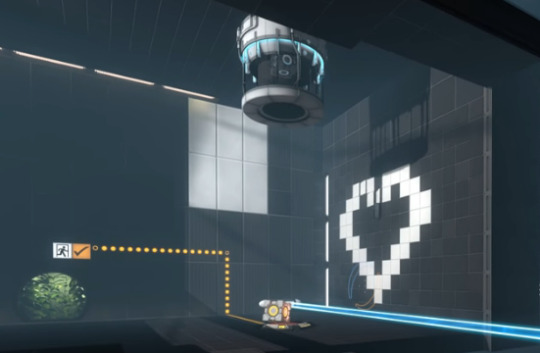
Up to this point, a lot of the points I’ve presented are interspersed with a fair amount of antagonization on GLaDOS’ behalf, more Foe Yay than anything actually hinting at something deeper than GLaDOS being conflicted about whether she loves or hates Chell. But things really ramp up after Wheatley’s betrayal, when the two of them are forced to team up. (I should also note here that “enemies to lovers” is a pretty classic queer romance trope.)
Here, GLaDOS is put on an equal level with Chell and they have to rely on each other if they want to survive. For the rest of the singleplayer campaign, GLaDOS becomes a lot nicer and even friendly to Chell. There comes a point where she starts referring to Chell as a teammate, calling them “we.” She begins to consider them one unit, two opposites unified. Here’s what she says after the lemon rant:

You can not only see her using we, but actively talking about how her and Chell are going to fight Wheatley together. There’s also that last line - “let’s explode with some dignity.” GLaDOS has fully accepted the very likely possibility that she and Chell might die together. That she might die on the same level, and the same team as Chell. And she seems... surprisingly okay with that, as long as she and Chell go together.
It’s during the Old Aperture levels that Chell and GLaDOS also discover that they have a lot in common. This is the part of the game where GLaDOS figures out she’s Caroline, that she’s human. Or, that she’s like Chell. And Chell discovers (from what we can tell anyway) that Caroline is kind, that she’s funny and smart and so many of these things she never noticed about GLaDOS before. Now also with the knowledge she is fighting alongside another human being.
You can also draw parallels between Chell and Caroline, both intelligent women ultimately betrayed by their seemingly innocuous male friends before being trapped in Aperture and forced to team up with one another in a way that will free both of them. We see that really, GLaDOS isn’t that different from Chell - she too has been imprisoned in this place against her will, but in a completely different way. Once again, the idea of two sides of the same coin applies here.
I’ve written another meta about this before, but I also think the whole idea of repressing a part of your identity and hating it, before bonding with another woman and then realizing that it’s okay to be like her and to be on her side. It’s okay to be yourself and meeting her is what helps you discover this new part of yourself. Is kinda inherently gay. GLaDOS’ discovery of her own humanity just fits so well into a queer realization narrative, to me at least.
Then, Chell and GLaDOS escape Old Aperture and have to get through Wheatley’s tests.
Here, GLaDOS isn’t just begrudgingly on Chell’s team. She’s actively helpful. She wants to help Chell solve tests, defends her from Wheatley’s insults, and makes jokes to lighten the mood. Things that can really only be explained by her caring about Chell, especially the part about the insults. See below.
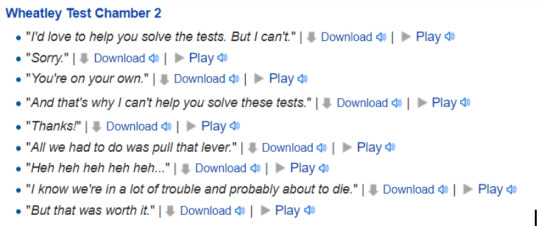

After the two escape Wheatley’s testing track, right before the boss fight GLaDOS has a few other things to say.

GLaDOS is not going to betray Chell, because of some kind of conscience. But she could easily ignore that back in her body, and yet? Here she’s deciding not to, and for no good reason. She didn’t have to say that to Chell, but she did, because she cares and she wants Chell to live.
And then, moments before the fight:

The final lines imply that GLaDOS does not think of Chell as an enemy anymore, and that it doesn’t matter what Chell thinks because they are in this together and they are getting revenge together. It’s pretty heartwarming to be honest, to know that even in a fight that will almost certainly kill you, she is there rooting for you and caring about you, even if you don’t feel the same way about her. It no longer matters to GLaDOS whether you even reciprocate - you staying alive, you making it through is enough for her.
So Chell fights Wheatley and sends him into space, all well and good, and at this point, GLaDOS has the option to kill Chell. But not only does she not, she actively saves Chell, and holds her hand in the process. If you don’t believe me:
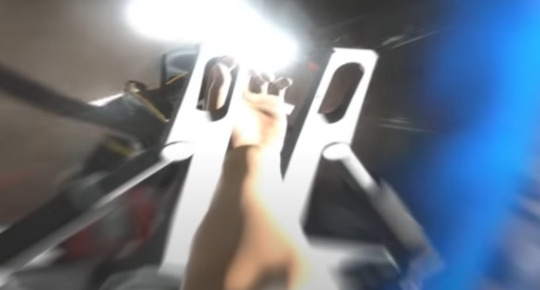
And not only that, but when Chell goes unconscious from her injuries, GLaDOS sits and waits for her to wake up. It’s also implied that GLaDOS carries her to the elevator, since it’s where she wakes up but not where she passed out. In the scene where Chell blacks out, you can also hear the part of Love As A Construct that sounds like Cara Mia. Yeah. Yeah.
If you think that this cannot possibly get any gayer, you are wrong again, because then GLaDOS makes her final speech. Which is really just a love confession, let’s be honest.

The “surge of emotion?” Do you mean love, GLaDOS? And the idea of GLaDOS considering Chell her best friend, despite everything these two have done to each other? The idea that GLaDOS, out of all people, forgives someone?
Except this isn’t even Chell’s final send-off. GLaDOS writes her an entire opera of turrets, that sing a literal love song. (Note what I said earlier about the use of the word “bambina”).

It really can’t get any more obvious than that. “My (affectionate romantic term here), my dear, I adore you.” How. Is. That. Heterosexual. In. Any. Way.
So Chell goes to the surface, set free by GLaDOS (think of the saying “if you love something, set it free), and you think that’s the end. Until GLaDOS gives you a companion cube so you aren’t alone on the journey, and from the burn marks, you know it’s your first companion cube. Her original heart, her first gift to you, a piece of her that she wants you to carry with you to remind you that she does care about you after everything. It also gives the lyrics to Still Alive a much more genuine meaning.
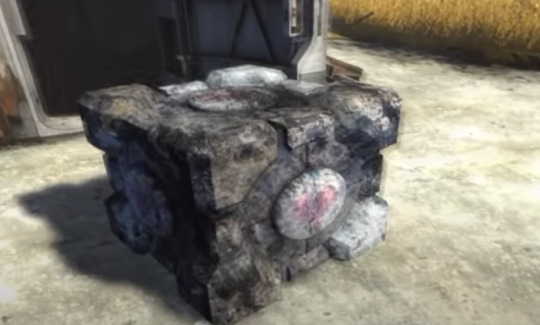
Portal 2 ends, and then the ending song, another GLaDOS number plays. Just like Still Alive, Want You Gone is structurally a break up song and very obviously about GLaDOS missing Chell and “counting on” (read: caring about/loving) Chell’s tendencies and quirks.

She’s accepted Chell completely, and yet also given Chell the one thing she wants most. Only wanting Chell gone can mean GLaDOS not wanting Chell in her life anymore, but can also mean she wants to give Chell the freedom she’s wanted for so, so long. It’s the best thing she can give.
In the co-op campaign, GLaDOS also references still caring about Chell.

And that’s the end of the Portal series. Except. Brace yourself. Despite the games being over, there is STILL more subtext somehow. It gets. Even gayer.
Exhibit C: Supplemental Evidence
Valve has made a lot of extra/cut content for the Portal series, and I’ll be looking at some of it below.

This official valentine from Valve shows GLaDOS offering a romantic partner cake, which as we’ve established before, is very symbolic of GLaDOS’ feelings about and/or relationship with Chell.
There’s a lot of other concept art and official art that emphasizes their relationship too. See below.

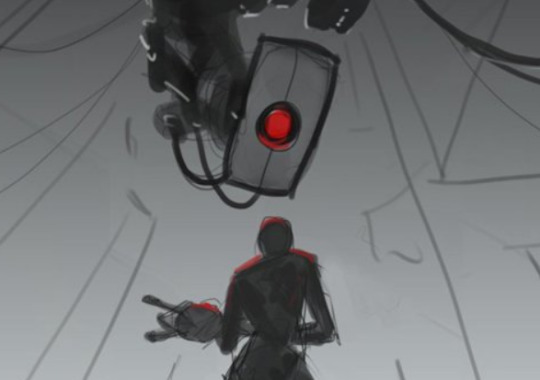
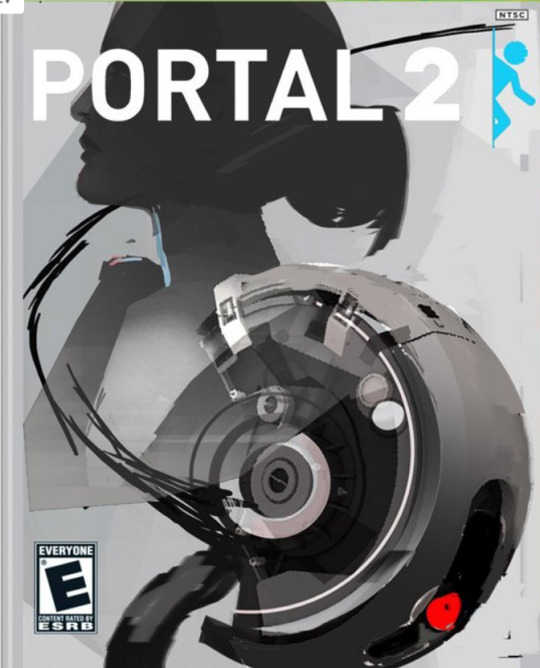
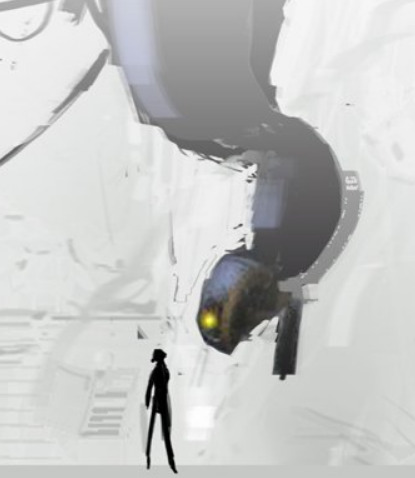
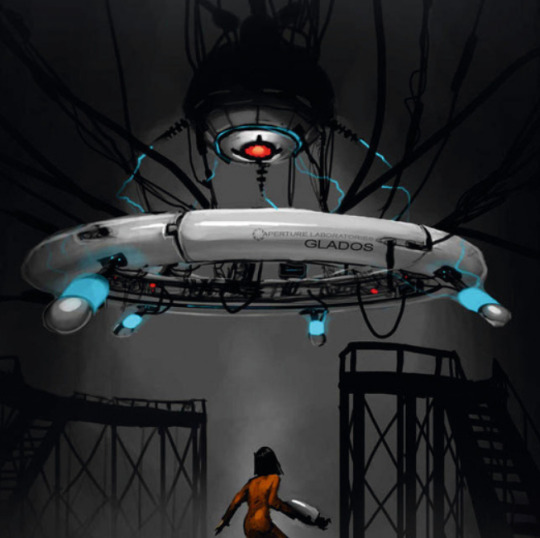
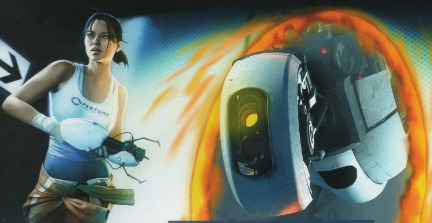

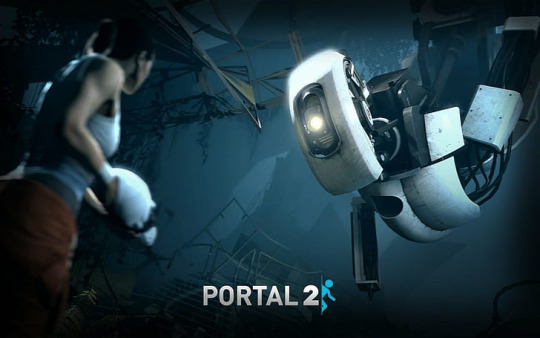
There’s also some cut GLaDOS lines that are even gayer than the source material and again, sound like confessions or references to a breakup:

The idea of “discovering things about someone”... how much more obvious can it get?
The developers have even confirmed a lot of my commentary on Chell and GLaDOS’ relationship in The Final Hours Of Portal 2. See these quotes from the book/this post:
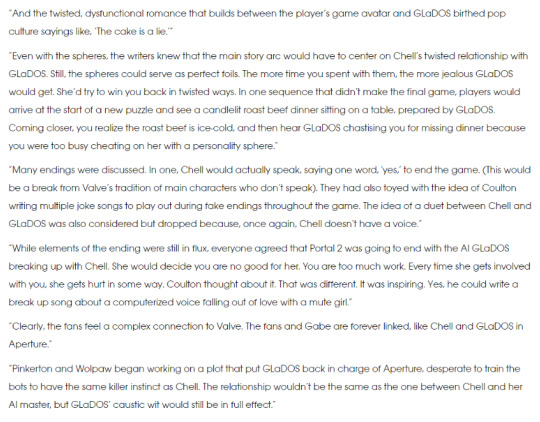
The devs literally describe it as a romance. They use terms like “cheating,” they wanted to write a romantic duet, JoCo purposefully wrote the endings like love songs. It is literally, blatantly said by the creators of the game that their relationship is interpreted romantically. By the creators of the game.
And if Word of God confirmation isn’t enough for you, have a song written for a cut alternate ending by GLaDOS’ voice actress, Ellen McClain. The song is literally nothing but GLaDOS talking about caring about Chell, about not wanting her to die/leave GLaDOS alone, about wanting to bake a cake with Chell, about waiting for Chell to wake her up. It’s so genuinely sweet and sad, and really, really romantic in the most heartwrenching way possible.
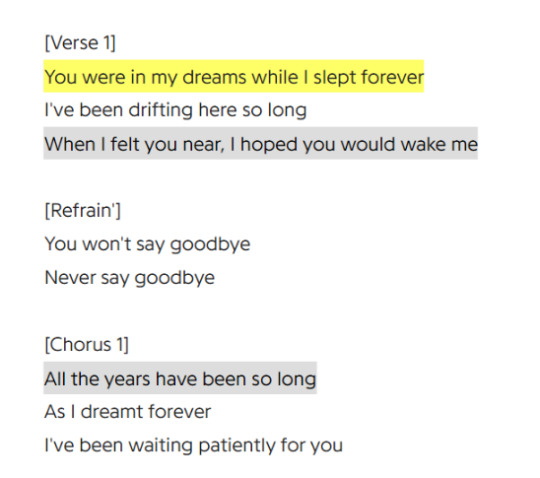
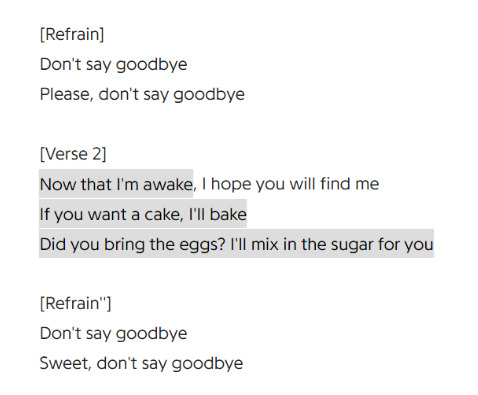

JoCo also came back for the Portal levels in Lego Dimensions, writing one final breakup song for GLaDOS to sing about Chell. It comes off as GLaDOS not wanting to admit she misses Chell even though she obviously does, trying to replace their relationship but failing, and even explicitly forgiving Chell/wanting her to come back.
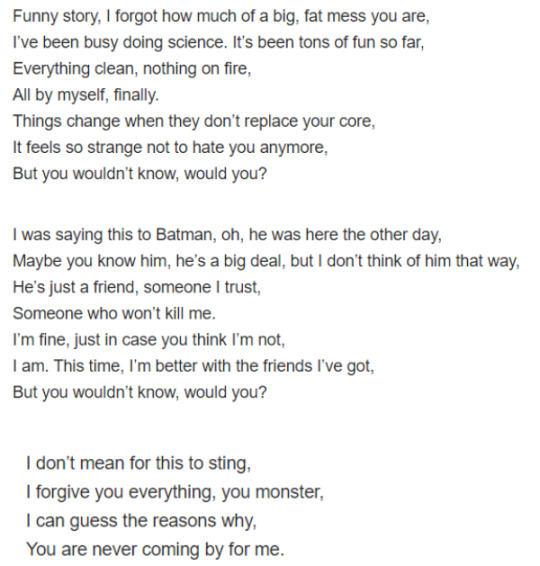

Also, the “finally I understand,” as if only now GLaDOS understands just how deep her feelings for Chell are... What else can I say?
In Lego Dimensions, GLaDOS also outright rejects anyone who isn’t Chell.

In Conclusion:
Why do I ship Chell and GLaDOS?
Well, ultimately, it doesn’t matter whether I ship them.
Because I think it’s glaringly obvious Portal does.
3K notes
·
View notes
Text
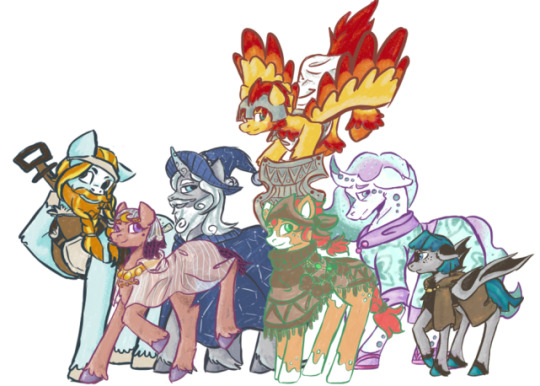
Small concept for the pillars (already changed, not linked to the AU) and my problem with them pretty much x'DD I really like them, but I think they are extremely under-used. They appeared what, 4 times in the whole series for the most part ? (except Stygian who litterally appeared twice, in the finale about the pillars and once referenced as an author, not even here x'DD And Starswirl who got a bit more mention, but even then, still not a lot) And they had so much potential ! For me, the best thing would have been to make them antagonists (not villains) during a season. They each have an opposing member of the mane 6, they are a far more powerful group without the use of the elements (or well, should be *looking at you the pillars vs tirek fight*) and they have a pretty opposite view from the mane 6 despite having used the same methods multiples times (the pillars stops the threats without proposing a chance at redemption, the mane 6 did it multiple time but they also offered redemption).
Stygian could have been very interesting by not making him guilty of stealing (bc yeah, he still took without asking his friends artifacts... They should have let him explain, bc he could have had a good reason (for example, there could have been a curse put on the artifacts, curse which could kill his friends before they came back when he saw it. In that case, he would have been justified (and he could have, like, put a note but they didn't found it) in doing without asking because there would be a high chance that they never make it back in time for him to ask.). Instead, it would have been interesting that he was casted out after a disput where he began doubting the casting away method or even him getting upset about being let in the shadows despite all the work he does for them.
Also, the pony of shadow. NOTHING was done with them. All they did is being a big mouth and it's really disapointing, particularly when we see them *resisting* the elements of harmony. They were just a tool to get the pillars to seal themselves away ! They didn't even came back with other villains despite being in a known location ! They could have gaven them to Cozy for example instead of making her an alicorn with the bell, or to Sombra even. Not to mention that they were mentionned far earlier in the series and... had nothing to do with that mention :/
So yeah, in my AU, I'd like to make them more important, all without eclipsing the mane 6. There are some hated episodes which could have been made far better by using the pillars (whose relationship could be rocky since they were less a friend group and more a work group. And could also be on hills with the whole change of time period + what happened with stygian, particularly if they find themselves as the villains of that story. Not to mention it could allow for old lessons to be re-relearned with the same character as main, but not as "they need to relearn it" but more as a "they need to reinforced it in themselves and helping others with that same problem"). And I hesitate a lot because if I talked about the closest concept I had to canon here, there are LOADS of things which could have been done. (Calling them bc a still villain starlight uses starswirl spells and the p.o.s is seen as not as much of a threat? (which would make their return even more epic because the threat is *seen* but just seen as a necessary risk) And villain starlight taking stygian "under her wings" to be able to access the power of p.o.s ? Good Starlight "falling back to evilness" and Starswirl trying to use it as proof of his world view? P.o.s escaping and the pillars begin trying to act on reformed villains? (using discord old betrayal as proof of the need to do it?) With Luna running away when Celestia wants to put her in safety before Starswirl learns of Nightmare Moon? Luna creating some Nightmare knights to saves people while in hiding with other reformed villains (some even low-grade, but still attacked by pillars)? So many possibilities ! AAAAAAAH)
So yeah, that was kind of a rant x'DD
Oh also, here Stygian is a bat pony bc my first idea was to make him one and the pony of shadow a kind of force protecting bat ponies. With that idea, I was thinking of making batponies extincts and the p.o.s of Castlemania a residue of it, staying where the last batponies went to pay respect to Luna, princess of the night, their time of day. But I kind of let this idea behind now. I also didn't really liked what I did for most of them
#pillars of equestria#mlp fim#mlp friendship is magic#mlp stygian#mlp redesign#mlp au#my little pony#starswirl the bearded#flash magnus#rockhoof#mage meadowbrook#mistmane#somnanbula
36 notes
·
View notes
Text
[Review]全球高考

Title: 全球高考 Global Examination
Author: 木苏里
Length: 166 chapters
Rating: M
Tag: Infinite flow, action, mystery
Summary [taken from novel updates]:
The whole world is subjected to a highly dangerous standardised exam called the Global University Entrance Examination. Answering questions by putting their lives at stake, they would live if they passed the test. Every month the exam will undergo reformation while, occasionally, it is random.
Novel | Novel [translated] | Audio drama | Manhua
Comments **contains spoilers**:
Second time reading this novel. To summarize the plot simply, the characters are placed in a system where they have to pass different exams to get out. However, the exams are only tangentially related to common subjects: for example, the foreign language exam didn’t so much test their mastery of the language as it tested their ability to decipher Hei Po’s instructions and survive monsters within the village. Aside from the exams, there are also invigilators to enforce the rules and punish any examinee who broke them. The thing is, invigilators are not entirely immune from the punishments of the system, especially if they break the exam system or venue themselves.
Originally, the examination system was designed for military purposes and served as a training ground. At one point, the system started malfunctioning and selecting random people to participate in the exams. Attempts have been made to fix the system, to no avail. The story therefore follows MC and ML’s efforts to fix (read: break) the system.
Highlights
As someone who loves worldbuilding, some of the exams have very unique worldbuilding and twists in them. E.g. In the mirror people’s world, the MC, ML, and their team realized that they have become the antagonists that have to be killed in order for other examinees to pass. Thus, the MC and ML have to find creative ways to pass the exams.
Talking about creative ways, it is fun to read about how You Huo and Qin Jiu constantly think out of the box, doing outrageous things such as breaking the exam venues or killing the NPCs. Sometimes they even use the rules of the exams against the system. E.g. there was an exam where the entire team was tied to You Huo’s name, so every time one of the team members got pushed into the mirror, the system would announce that You Huo died. Imagine the confusion when other examinees and invigilators saw multiple You Huos dying and coming back to life. 922, 154, and 021 were so, so done lol.
Plot-wise, there is an ongoing mystery surrounding You Huo and Qin Jiu’ past. We were given glimpses of the time You Huo was the first invigilator and Qin Jiu the examinee. How their roles switched, why they forgot about the past, and what are the roles of the invigilators became an intriguing mystery that keep the story moving.
Out of all the infinite flow novels I read so far, QQGK definitely gave the most logical explanation of how and why the system exist, such as why the system sometimes behave in a contradictory manner, how certain characters are tied to the system (e.g. NPCs and invigilators), and how they, in turn, relate to MC and ML. I thought this really grounded the novel and gives a nice closure to the story.
12 notes
·
View notes